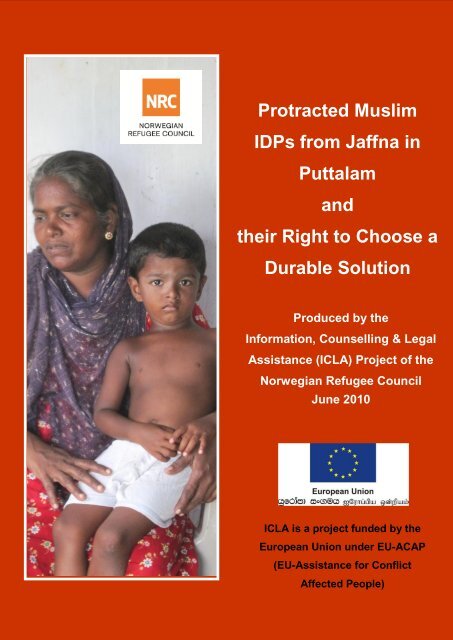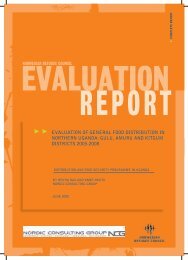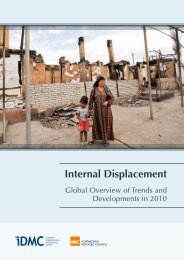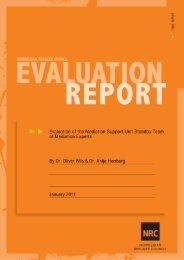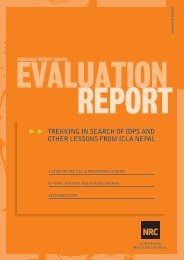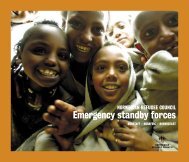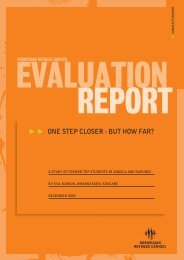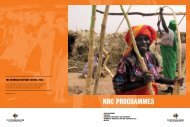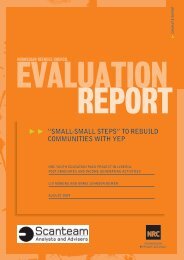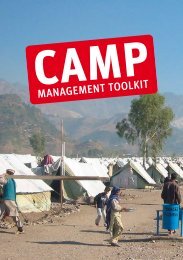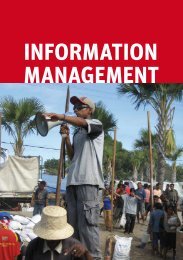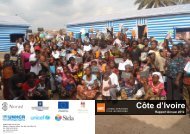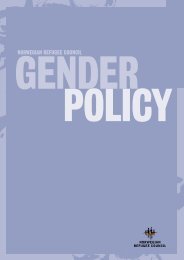Protracted Muslim IDPs from Jaffna in Puttalam and their Right to ...
Protracted Muslim IDPs from Jaffna in Puttalam and their Right to ...
Protracted Muslim IDPs from Jaffna in Puttalam and their Right to ...
You also want an ePaper? Increase the reach of your titles
YUMPU automatically turns print PDFs into web optimized ePapers that Google loves.
<strong>Protracted</strong> <strong>Muslim</strong><br />
<strong>IDPs</strong> <strong>from</strong> <strong>Jaffna</strong> <strong>in</strong><br />
<strong>Puttalam</strong><br />
<strong>and</strong><br />
<strong>their</strong> <strong>Right</strong> <strong>to</strong> Choose a<br />
Durable Solution<br />
Produced by the<br />
Information, Counsell<strong>in</strong>g & Legal<br />
Assistance (ICLA) Project of the<br />
Norwegian Refugee Council<br />
June 2010<br />
i<br />
ICLA is a project funded by the<br />
European Union under EU-ACAP<br />
(EU-Assistance for Conflict<br />
Affected People)
ACKNOWLEDGEMENTS<br />
The Information, Counsell<strong>in</strong>g & Legal Assistance (ICLA) project of the Norwegian Refugee Council<br />
(NRC) <strong>in</strong> Sri Lanka is grateful <strong>to</strong> our donor, the EU-ACAP (European Union- Assistance for Conflict<br />
Affected People) Programme, whose support made this thematic report possible <strong>and</strong> <strong>to</strong> Mirak<br />
Raheem with the Centre for Policy Alternatives (CPA) <strong>and</strong> Dr. Farzana Haniffa with the Law & Society<br />
Trust (LST) who generously contributed <strong>their</strong> time <strong>to</strong> review the report.<br />
We wish <strong>to</strong> thank our former Country Direc<strong>to</strong>r, Toril Brekke, who recognised that durable solutions for<br />
protracted <strong>Muslim</strong> <strong>IDPs</strong> <strong>in</strong> <strong>Puttalam</strong> is a vital <strong>and</strong> timely issue <strong>to</strong> be highlighted. We express our<br />
gratitude <strong>to</strong> the ICLA team <strong>in</strong> <strong>Puttalam</strong>, particularly Priyangika Amarathunge, Rusl<strong>in</strong> Farook, R<strong>in</strong>osa<br />
Jabir, Rimziya Kaldeen, Ranjan Shrikantha Kurian, Fathima Segu Mathar, Sujithra Mohanadas <strong>and</strong><br />
Ch<strong>and</strong>radevi Sivayogam, who carried out the data-collection for this report <strong>in</strong> a number of welfare<br />
centres <strong>in</strong> <strong>Puttalam</strong>, <strong>to</strong> Samsudeen Safi Nayaj for his work on the graphs <strong>and</strong> tables <strong>in</strong> this report, <strong>and</strong><br />
<strong>to</strong> Himangi Jayasundere for her edit<strong>in</strong>g <strong>and</strong> report layout work.<br />
Amila Jayamaha<br />
Project Coord<strong>in</strong>a<strong>to</strong>r, Legal<br />
ICLA, NRC<br />
Kavita Shukla<br />
Programme Impact & Policy Analyst<br />
NRC<br />
iii
EXECUTIVE SUMMARY<br />
Over 60,000 <strong>Muslim</strong> persons expelled <strong>from</strong> <strong>their</strong> native districts of <strong>Jaffna</strong>, Kil<strong>in</strong>ochchi, Mullaitivu,<br />
Mannar <strong>and</strong> Vavuniya <strong>in</strong> northern Sri Lanka by the Liberation Tigers of Tamil Eelam (LTTE) <strong>in</strong> 1990<br />
have been liv<strong>in</strong>g <strong>in</strong> a state of protracted displacement for the past 20 years <strong>in</strong> the <strong>Puttalam</strong> district.<br />
Few <strong>in</strong>itiatives, both on the part of government <strong>and</strong> non-governmental ac<strong>to</strong>rs have sought <strong>to</strong> address<br />
the needs <strong>and</strong> concerns of these <strong>in</strong>dividuals, many of whom cont<strong>in</strong>ue <strong>to</strong> identify themselves as<br />
uprooted persons dist<strong>in</strong>ct <strong>from</strong> the host community <strong>in</strong> <strong>Puttalam</strong>.<br />
In this context, the Norwegian Refugee Council (NRC), work<strong>in</strong>g with<strong>in</strong> its m<strong>and</strong>ate <strong>to</strong> contribute <strong>to</strong><br />
durable solutions for those affected by the conflict, under<strong>to</strong>ok a study <strong>and</strong> compiled a thematic report<br />
on the choice of durable solutions available <strong>to</strong> the <strong>in</strong>ternally displaced <strong>Muslim</strong> population <strong>from</strong> <strong>Jaffna</strong><br />
district, liv<strong>in</strong>g <strong>in</strong> welfare centres <strong>in</strong> <strong>Puttalam</strong>. The study was carried out by the Information,<br />
Counsell<strong>in</strong>g & Legal Assistance (ICLA) Project.<br />
Until the war‟s end <strong>in</strong> May 2009, local <strong>in</strong>tegration <strong>in</strong> <strong>Puttalam</strong> appeared <strong>to</strong> be the only durable solution<br />
available <strong>to</strong> this population, because the environment <strong>in</strong> the north was not conducive <strong>to</strong> return due <strong>to</strong><br />
the ongo<strong>in</strong>g armed conflict <strong>and</strong> security concerns. In the post-conflict context, return <strong>to</strong> the area of<br />
orig<strong>in</strong> has become an alternative durable solution <strong>to</strong> local <strong>in</strong>tegration <strong>and</strong> settlement elsewhere. There<br />
have been contrary assumptions among officials, donors, the media <strong>and</strong> the aid community about the<br />
choice of durable solutions for this population. Some cont<strong>in</strong>ue <strong>to</strong> believe that ultimately all <strong>in</strong>ternally<br />
displaced persons (<strong>IDPs</strong>) will go back <strong>to</strong> the north despite liv<strong>in</strong>g <strong>in</strong> <strong>Puttalam</strong> for years; others believe<br />
that age will be the key fac<strong>to</strong>r determ<strong>in</strong><strong>in</strong>g return with the older generation go<strong>in</strong>g back <strong>and</strong> the<br />
younger generation choos<strong>in</strong>g <strong>to</strong> stay beh<strong>in</strong>d; <strong>and</strong> yet others believe that many of the <strong>IDPs</strong> have<br />
already locally <strong>in</strong>tegrated <strong>to</strong> a large extent due <strong>to</strong> ownership of property <strong>in</strong> <strong>Puttalam</strong>. There has been<br />
no systematic study on the durable option preferred by the <strong>IDPs</strong> <strong>and</strong> the reasons for this preference.<br />
This report seeks <strong>to</strong> address, <strong>in</strong> part, the lack of a systematic study on durable solution options for the<br />
protracted <strong>Muslim</strong> <strong>IDPs</strong> follow<strong>in</strong>g the end of conflict. It acknowledges both the decision <strong>to</strong> stay <strong>and</strong> the<br />
decision <strong>to</strong> return as lead<strong>in</strong>g <strong>to</strong> durable solutions, with the pivotal fac<strong>to</strong>r be<strong>in</strong>g the right of the <strong>IDPs</strong> <strong>to</strong><br />
choose either option. Fac<strong>to</strong>rs such as age, ownership of property <strong>and</strong> livelihood opportunities have<br />
been explored <strong>in</strong> relation <strong>to</strong> <strong>their</strong> <strong>in</strong>fluence on this choice.<br />
The ma<strong>in</strong> <strong>to</strong>ol of data collection for the study was a survey dur<strong>in</strong>g which <strong>in</strong>dividuals <strong>from</strong> 621 families<br />
were <strong>in</strong>terviewed. This amounted <strong>to</strong> <strong>in</strong>terviews of members of over 25 percent of the approximately<br />
2,200 IDP families <strong>from</strong> <strong>Jaffna</strong> liv<strong>in</strong>g <strong>in</strong> welfare centres <strong>in</strong> <strong>Puttalam</strong>. The questionnaire used was<br />
ma<strong>in</strong>ly framed around the choice made <strong>to</strong> return or stay, reasons beh<strong>in</strong>d the choice, areas such as<br />
access <strong>to</strong> <strong>in</strong>formation, availability of documentation necessary <strong>to</strong> secure rights <strong>and</strong> services,<br />
ownership of hous<strong>in</strong>g, l<strong>and</strong> <strong>and</strong> property (HLP), <strong>and</strong> economic <strong>and</strong> livelihood opportunities.<br />
iv
Out of the 621 respondents, 48 percent <strong>in</strong>dicated that they <strong>in</strong>tended <strong>to</strong> return <strong>to</strong> <strong>Jaffna</strong> while the<br />
balance 52 percent expressed the <strong>in</strong>tention <strong>to</strong> rema<strong>in</strong> <strong>in</strong> <strong>Puttalam</strong>. The pr<strong>in</strong>cipal reasons for the<br />
decision <strong>to</strong> return were emotional ties <strong>to</strong> <strong>Jaffna</strong> as home, perceived better economic <strong>and</strong> livelihood<br />
opportunities <strong>and</strong> ownership of HLP <strong>in</strong> <strong>Jaffna</strong>. These same reasons were provided for the decision <strong>to</strong><br />
rema<strong>in</strong> <strong>in</strong> <strong>Puttalam</strong>, albeit <strong>in</strong> different degrees of importance. For example, while the consideration of<br />
<strong>Jaffna</strong> as home was the most important reason beh<strong>in</strong>d the decision <strong>to</strong> return, <strong>in</strong> the case of the<br />
decision <strong>to</strong> stay the perception of <strong>Puttalam</strong> as home came second <strong>to</strong> HLP ownership <strong>in</strong> this location.<br />
Around 40 percent of the <strong>to</strong>tal respondents said that there would be family separations due <strong>to</strong><br />
different choices be<strong>in</strong>g made with<strong>in</strong> the same family. The f<strong>in</strong>d<strong>in</strong>gs <strong>in</strong>dicated that there was no clear<br />
preference for either return or local <strong>in</strong>tegration among respondents on the basis of <strong>their</strong> age. Further,<br />
for the majority of the respondents, the decision <strong>to</strong> stay or return was made <strong>in</strong>dependently outside of<br />
family <strong>and</strong> community pressure.<br />
This survey is an <strong>in</strong>dication of trends relat<strong>in</strong>g <strong>to</strong> return <strong>and</strong> <strong>in</strong>tegration <strong>and</strong> more research needs <strong>to</strong> be<br />
undertaken <strong>to</strong> determ<strong>in</strong>e whether the trends applicable <strong>in</strong> the case of the 621 <strong>in</strong>dividuals extends <strong>to</strong><br />
others <strong>in</strong> the <strong>Jaffna</strong> IDP community, as well as the Northern <strong>Muslim</strong> <strong>IDPs</strong> <strong>from</strong> other districts liv<strong>in</strong>g <strong>in</strong><br />
<strong>Puttalam</strong>.<br />
As recognised with<strong>in</strong> the <strong>in</strong>ternational policy <strong>and</strong> guid<strong>in</strong>g framework of durable solutions <strong>to</strong> end<br />
displacement (for example, the Inter-Agency St<strong>and</strong><strong>in</strong>g Committee Framework on Durable Solutions<br />
for <strong>IDPs</strong>), access <strong>and</strong> the right <strong>to</strong> <strong>in</strong>formation play a key role <strong>in</strong> enabl<strong>in</strong>g <strong>in</strong>dividuals <strong>to</strong> make an<br />
<strong>in</strong>formed <strong>and</strong> voluntary choice as <strong>to</strong> the durable solution which best meets <strong>their</strong> needs <strong>and</strong><br />
circumstances. The f<strong>in</strong>d<strong>in</strong>gs <strong>in</strong>dicated that the selected IDP community <strong>in</strong> <strong>Puttalam</strong> has not been able<br />
<strong>to</strong> fully exercise its right <strong>to</strong> <strong>in</strong>formation. There appears <strong>to</strong> have been little effort <strong>from</strong> the government<br />
<strong>and</strong> relevant m<strong>in</strong>istries <strong>to</strong> systematically dissem<strong>in</strong>ate <strong>in</strong>formation <strong>to</strong> update the <strong>IDPs</strong> about <strong>their</strong><br />
options follow<strong>in</strong>g an end <strong>to</strong> the conflict <strong>in</strong> May 2009. This is demonstrated by most of the <strong>IDPs</strong><br />
claim<strong>in</strong>g <strong>to</strong> have heard about the possibility of return for the first time <strong>from</strong> <strong>their</strong> own community, <strong>and</strong><br />
only a m<strong>in</strong>iscule 6 percent hear<strong>in</strong>g of return as a possible durable solution <strong>from</strong> government sources.<br />
In relation <strong>to</strong> questions answered by selected respondents on <strong>their</strong> source of <strong>in</strong>formation, the people<br />
who received or heard <strong>in</strong>formation <strong>from</strong> government or semi-government related sources were <strong>in</strong> the<br />
m<strong>in</strong>ority. This can be seen as a violation of the „right <strong>to</strong> <strong>in</strong>formation‟ implicit <strong>in</strong> the fundamental right <strong>to</strong><br />
freedom of speech <strong>and</strong> expression conta<strong>in</strong>ed <strong>in</strong> the 1978 Constitution of Sri Lanka <strong>and</strong> is a significant<br />
obstacle <strong>in</strong> enabl<strong>in</strong>g <strong>IDPs</strong> <strong>to</strong> make an <strong>in</strong>formed choice about return or local <strong>in</strong>tegration. Additionally,<br />
there appears <strong>to</strong> be no overall systematic approach by the government <strong>to</strong> assist persons liv<strong>in</strong>g <strong>in</strong><br />
protracted displacement <strong>in</strong> Sri Lanka with f<strong>in</strong>d<strong>in</strong>g durable solutions.<br />
Stemm<strong>in</strong>g <strong>from</strong> these f<strong>in</strong>d<strong>in</strong>gs, NRC recommends <strong>to</strong> the Government of Sri Lanka that it acts <strong>to</strong><br />
secure an <strong>in</strong>formed <strong>and</strong> voluntary choice of durable solutions for the protracted <strong>IDPs</strong> <strong>in</strong> the country<br />
v
<strong>and</strong> <strong>to</strong> address the needs of these persons <strong>in</strong> a systematic way. An aspect of this process <strong>in</strong>cludes<br />
not only shar<strong>in</strong>g <strong>in</strong>formation with <strong>IDPs</strong> but also consult<strong>in</strong>g <strong>and</strong> <strong>in</strong>volv<strong>in</strong>g them <strong>in</strong> decisions that will<br />
impact <strong>their</strong> lives.<br />
NRC recommends <strong>to</strong> the donor community that it demonstrate equity <strong>in</strong> response <strong>to</strong> ongo<strong>in</strong>g<br />
assistance or achievement of durable solutions for all <strong>IDPs</strong> <strong>in</strong> Sri Lanka, regardless of period of<br />
displacement; <strong>and</strong> <strong>to</strong> national <strong>and</strong> <strong>in</strong>ternational non-governmental organisations <strong>and</strong> UN agencies<br />
that they assist the protracted IDP community <strong>in</strong> better underst<strong>and</strong><strong>in</strong>g its rights related <strong>to</strong> durable<br />
solutions, <strong>and</strong> provide <strong>in</strong>formation <strong>and</strong> counsell<strong>in</strong>g on the two options of return <strong>and</strong> local <strong>in</strong>tegration.<br />
(See full list of recommendations on page 22.)<br />
vi
LIST OF TABLES<br />
1. Breakdown by age of respondents want<strong>in</strong>g <strong>to</strong> stay or return<br />
2. Reasons for want<strong>in</strong>g <strong>to</strong> return <strong>to</strong> <strong>Jaffna</strong><br />
3. Timel<strong>in</strong>e of return <strong>to</strong> <strong>Jaffna</strong><br />
4. Reasons for want<strong>in</strong>g <strong>to</strong> rema<strong>in</strong> <strong>in</strong> <strong>Puttalam</strong><br />
5. Reasons for family separations<br />
6. Expectations about type of assistance <strong>to</strong> <strong>Jaffna</strong> returnees<br />
7. Sources of <strong>in</strong>formation on return assistance<br />
8. Expectations about type of assistance <strong>to</strong> those rema<strong>in</strong><strong>in</strong>g <strong>in</strong> <strong>Puttalam</strong><br />
9. Sources of <strong>in</strong>formation on assistance <strong>in</strong> <strong>Puttalam</strong><br />
10. Status of civil documentation<br />
11. Property ownership <strong>in</strong> <strong>Jaffna</strong><br />
12. Property ownership <strong>in</strong> <strong>Puttalam</strong><br />
13. Livelihoods <strong>and</strong> HLP access of <strong>Jaffna</strong> returnees<br />
14. Freedom of movement situation <strong>in</strong> <strong>Jaffna</strong><br />
15. Sources of <strong>in</strong>formation on situation <strong>in</strong> <strong>Jaffna</strong><br />
16. Facilitation of „go <strong>and</strong> see‟ visits<br />
17. Biggest challenges anticipated by those want<strong>in</strong>g <strong>to</strong> return<br />
vii
I. Background<br />
The Information, Counsell<strong>in</strong>g & Legal Assistance (ICLA) Project of the Norwegian Refugee Council<br />
(NRC) has been operational <strong>in</strong> Sri Lanka s<strong>in</strong>ce 2005 with activities currently be<strong>in</strong>g carried out <strong>in</strong> six<br />
districts. In the <strong>Puttalam</strong>, Tr<strong>in</strong>comalee, Batticaloa <strong>and</strong> Ampara districts, ICLA is funded by the<br />
European Union under its European Union Assistance for Conflict Affected People (EU-ACAP)<br />
programme.<br />
The foundational objective of ICLA is support<strong>in</strong>g durable solutions for those displaced/affected by<br />
conflict <strong>and</strong> assist<strong>in</strong>g them <strong>in</strong> obta<strong>in</strong><strong>in</strong>g <strong>their</strong> rights, particularly those l<strong>in</strong>ked <strong>to</strong> safe, dignified <strong>and</strong><br />
susta<strong>in</strong>able return. While <strong>in</strong>ternally displaced persons (<strong>IDPs</strong>) <strong>and</strong> returnees cont<strong>in</strong>ue <strong>to</strong> be the primary<br />
beneficiaries, ICLA also provides assistance <strong>to</strong> other cross-cutt<strong>in</strong>g groups such as the <strong>in</strong>digent,<br />
female-headed households, host communities <strong>and</strong> survivors of sexual <strong>and</strong> gender-based violence.<br />
Through the provision of legal counsell<strong>in</strong>g, legal assistance, <strong>and</strong> <strong>in</strong>formation, ICLA empowers<br />
beneficiaries <strong>to</strong> make free <strong>and</strong> <strong>in</strong>formed decisions <strong>and</strong> facilitates the removal of obstacles that<br />
<strong>in</strong>dividuals encounter dur<strong>in</strong>g the return process.<br />
Advocacy is an <strong>in</strong>tegral component of ICLA activities. Thematic reports are produced as a key<br />
advocacy <strong>to</strong>ol aimed at <strong>in</strong>fluenc<strong>in</strong>g stakeholders <strong>and</strong> br<strong>in</strong>g<strong>in</strong>g about changes <strong>in</strong> policy <strong>and</strong> the law.<br />
The focus of this thematic report is on the availability <strong>and</strong> accessibility of durable solutions for the<br />
<strong>Muslim</strong> ethnic m<strong>in</strong>ority displaced <strong>from</strong> northern Sri Lanka s<strong>in</strong>ce 1990.<br />
Context<br />
The m<strong>in</strong>ority <strong>Muslim</strong> community comprises about 8 percent of the country‟s population of 20.2 million,<br />
accord<strong>in</strong>g <strong>to</strong> the Department of Census <strong>and</strong> Statistics <strong>in</strong> Sri Lanka. 1 This community is present <strong>in</strong><br />
significant numbers <strong>in</strong> the south, <strong>and</strong> <strong>in</strong> the east it constitutes one-third of the population of the<br />
Eastern Prov<strong>in</strong>ce. There used <strong>to</strong> be significant numbers of <strong>Muslim</strong>s <strong>in</strong> the north until <strong>their</strong> expulsion<br />
by the Liberation Tigers of Tamil Eelam (LTTE) <strong>from</strong> the northern districts of <strong>Jaffna</strong>, Kil<strong>in</strong>ochchi,<br />
Mullaitivu, Mannar <strong>and</strong> Vavuniya, <strong>in</strong> Oc<strong>to</strong>ber 1990.<br />
With<strong>in</strong> the context of the 26 year conflict between the Sri Lankan armed forces <strong>and</strong> the LTTE, the<br />
expulsion of the <strong>Muslim</strong> community by the LTTE st<strong>and</strong>s out <strong>in</strong> terms of scale, impact <strong>and</strong> its explicit<br />
<strong>to</strong>nes of ethnic cleans<strong>in</strong>g. 2 Virtually the entire <strong>Muslim</strong> population <strong>in</strong> the north was ordered <strong>to</strong> vacate its<br />
homes with<strong>in</strong> 48 hours by the LTTE; <strong>in</strong> <strong>Jaffna</strong>, where <strong>Muslim</strong>s constituted over 1.6 percent of the <strong>to</strong>tal<br />
population, 3 they were given two hours <strong>to</strong> leave <strong>and</strong> permitted <strong>to</strong> take only Rs. 150 ($1.40) with them. 4<br />
1<br />
IRIN, “Sri Lanka: Difficult homecom<strong>in</strong>g for <strong>Muslim</strong> <strong>IDPs</strong>,” 22 March 2010,<br />
http://www.ir<strong>in</strong>news.org/report.aspx?ReportId=88503.<br />
2 University Teachers for Human <strong>Right</strong>s (<strong>Jaffna</strong>), “The Politics of Destruction & the Human Tragedy,” Report<br />
No.6, 4 February 2001, http://www.uthr.org/Reports/Report6/Report6.htm.<br />
3 Government of Sri Lanka, “Percentage distribution of population by ethnic group <strong>and</strong> district, census 1981,<br />
2001,” http://www.statistics.gov.lk/abstract2009/chapters/Chap2/AB2-12.pdf.<br />
4 International Crisis Group, “Sri Lanka‟s <strong>Muslim</strong>s: Caught <strong>in</strong> the Crossfire,”<br />
1
These people, number<strong>in</strong>g over 75,000, were forced <strong>to</strong> condense <strong>their</strong> lives <strong>and</strong> memories <strong>in</strong><strong>to</strong> the<br />
limited number of moveable belong<strong>in</strong>gs <strong>and</strong> small amounts of cash they were allowed <strong>to</strong> take away<br />
with them. Hous<strong>in</strong>g, l<strong>and</strong> <strong>and</strong> property (HLP) had <strong>to</strong> be ab<strong>and</strong>oned <strong>and</strong> livelihoods were snatched<br />
away. Follow<strong>in</strong>g the expulsion, over 60,000 displaced <strong>Muslim</strong>s moved <strong>to</strong> <strong>Puttalam</strong> district <strong>in</strong> the North<br />
Western Prov<strong>in</strong>ce where the majority live <strong>in</strong> welfare centres. 5 Others who were f<strong>in</strong>ancially better off<br />
moved <strong>to</strong> locations such as Colombo <strong>and</strong> Negombo <strong>in</strong> the Western Prov<strong>in</strong>ce. The 20 year duration 6 of<br />
the Northern <strong>Muslim</strong>s‟ displacement has meant that the classification of these <strong>IDPs</strong> is <strong>in</strong> the „old‟ or<br />
pre-2006 caseload of Sri Lanka, with 2006 be<strong>in</strong>g the year that large-scale fight<strong>in</strong>g resumed between<br />
the armed forces <strong>and</strong> the LTTE, lead<strong>in</strong>g <strong>to</strong> fresh waves of mass displacement <strong>in</strong> the east <strong>and</strong> north.<br />
While the protracted nature of displacement has meant local <strong>in</strong>tegration <strong>in</strong> <strong>Puttalam</strong> for some, <strong>in</strong><br />
general, the impact of long term displacement has been negative with many IDP families be<strong>in</strong>g<br />
„forgotten‟ or gett<strong>in</strong>g „lost <strong>in</strong> the system.‟ Few <strong>in</strong>itiatives, both on the part of the government <strong>and</strong> nongovernmental<br />
ac<strong>to</strong>rs, have taken place over the past few years <strong>to</strong> address <strong>their</strong> needs <strong>and</strong> concerns.<br />
The last significant <strong>in</strong>itiative was a national consultation on protracted <strong>IDPs</strong> with<strong>in</strong> a framework of<br />
durable solutions organised by the M<strong>in</strong>istry of Disaster Management <strong>and</strong> Human <strong>Right</strong>s <strong>in</strong> September<br />
2008. The recommendations <strong>from</strong> the consultation were <strong>to</strong> be endorsed by the government but the<br />
process lost momentum as combat <strong>in</strong>tensified <strong>in</strong> the north soon after <strong>and</strong> new displacements started<br />
occurr<strong>in</strong>g.<br />
Some ac<strong>to</strong>rs ma<strong>in</strong>ta<strong>in</strong> that over the course of two decades of displacement the vast majority of the<br />
Northern <strong>Muslim</strong>s <strong>in</strong> <strong>Puttalam</strong> have more or less locally <strong>in</strong>tegrated. Many of the <strong>IDPs</strong>, however,<br />
disagree with this assessment <strong>and</strong> cont<strong>in</strong>ue <strong>to</strong> identify themselves as uprooted people dist<strong>in</strong>ct <strong>from</strong><br />
the host community <strong>in</strong> <strong>Puttalam</strong>. Unlike the local population, the <strong>IDPs</strong> receive rations <strong>from</strong> the<br />
government. Other resources or quotas, such as health services, <strong>in</strong>frastructure support <strong>and</strong><br />
educational facilities, allocated by the State <strong>to</strong> this population cont<strong>in</strong>ue <strong>to</strong> be sent <strong>to</strong> the north, despite<br />
the population not be<strong>in</strong>g <strong>in</strong> the north s<strong>in</strong>ce 1990. This has resulted <strong>in</strong> conflict with the host community<br />
over shar<strong>in</strong>g of limited resources. A number of the <strong>IDPs</strong> also stress that they are not registered <strong>to</strong><br />
vote <strong>in</strong> <strong>Puttalam</strong> <strong>and</strong> can only exercise <strong>their</strong> vot<strong>in</strong>g rights <strong>in</strong> the north. Some <strong>in</strong> the host community<br />
ma<strong>in</strong>ta<strong>in</strong> that the displaced do not want <strong>to</strong> register <strong>to</strong> vote <strong>in</strong> <strong>Puttalam</strong> as they are afraid of los<strong>in</strong>g <strong>their</strong><br />
IDP identity, status <strong>and</strong> concurrent benefits.<br />
For years many NGOs <strong>and</strong> policymakers perceived local <strong>in</strong>tegration as the only durable solution<br />
feasible for this community. Although some <strong>Muslim</strong>s considered return or even tried <strong>to</strong> return <strong>to</strong> <strong>their</strong><br />
places of orig<strong>in</strong> <strong>in</strong> the north especially after the 2002 Ceasefire Agreement between the government<br />
Asia Report No. 134, 29 May 2007, http://www.crisisgroup.org/~/media/Files/asia/south-asia/srilanka/134_sri_lanka_s_muslims_caught_<strong>in</strong>_the_crossfire.ashx.<br />
5 In Sri Lanka, the term refers <strong>to</strong> public or private build<strong>in</strong>gs/compounds that house <strong>IDPs</strong>. The term has been used<br />
regardless of the duration of displacement. For example, the government has referred <strong>to</strong> Menik Farm, the IDP<br />
camp established <strong>in</strong> 2009 as a “welfare centre”. In the <strong>Puttalam</strong> context, <strong>IDPs</strong> are described as liv<strong>in</strong>g <strong>in</strong> welfare<br />
centers as well as relocation villages.<br />
6 L<strong>in</strong>es, “35 <strong>Muslim</strong> Organizations Appeal <strong>to</strong> Make 2010 The Year of Return of Expelled Northern <strong>Muslim</strong>s,” 25<br />
January 2010, http://l<strong>in</strong>es-magaz<strong>in</strong>e.org/?p=1597.<br />
2
<strong>and</strong> the LTTE, they encountered many barriers such as damaged houses <strong>and</strong> overgrown l<strong>and</strong>s. In<br />
other cases, <strong>their</strong> properties were occupied by people <strong>from</strong> other ethnic communities, who were often<br />
themselves displaced by the conflict. As military confrontation began aga<strong>in</strong> <strong>in</strong> 2006, most of these<br />
returnees were forced out by fear of re-expulsion <strong>and</strong> lack of specific security guarantees <strong>from</strong> the<br />
LTTE. 7<br />
Local <strong>in</strong>tegration was also given a boost by the launch of a $34.2 million World Bank project <strong>in</strong> 2007,<br />
aimed at assist<strong>in</strong>g over 7,800 IDP families with permanent hous<strong>in</strong>g, water <strong>and</strong> sanitation, <strong>and</strong><br />
assistance with regularisation of l<strong>and</strong> titles. The criteria for beneficiary selection <strong>in</strong>cluded possession<br />
of l<strong>and</strong> title <strong>in</strong> <strong>Puttalam</strong> <strong>and</strong> a temporary or partly completed house with<strong>in</strong> the welfare centre. This<br />
project also extended some assistance <strong>to</strong> the host community. 8 In order <strong>to</strong> identify the beneficiaries<br />
<strong>from</strong> the IDP community, the World Bank requested a revalidation of a 2004 survey of welfare centres<br />
<strong>in</strong> <strong>Puttalam</strong> undertaken by UNHCR <strong>in</strong> collaboration with the M<strong>in</strong>istry of Resettlement <strong>and</strong> the M<strong>in</strong>istry<br />
of Nation Build<strong>in</strong>g <strong>and</strong> Development; this revalidation exercise was carried out <strong>in</strong> 2006 by UNHCR.<br />
Accord<strong>in</strong>g <strong>to</strong> the report on the revalidation exercise, there were 15,480 families liv<strong>in</strong>g <strong>in</strong> 141 locations<br />
<strong>in</strong> <strong>Puttalam</strong>. Whereas <strong>in</strong> 2004, only 2 percent of those surveyed had expressed <strong>in</strong>terest <strong>in</strong> return<strong>in</strong>g<br />
home immediately, 60 percent wished <strong>to</strong> return home <strong>in</strong> the future <strong>and</strong> 38 percent wished <strong>to</strong> locally<br />
<strong>in</strong>tegrate, by 2006 an overwhelm<strong>in</strong>g 96 percent expressed a preference for local <strong>in</strong>tegration <strong>and</strong> only<br />
4 percent wished <strong>to</strong> return home. The report attributed this change <strong>to</strong> reasons such as the protracted<br />
displacement <strong>and</strong> poor security <strong>in</strong> areas of orig<strong>in</strong>; <strong>and</strong> the World Bank‟s proposed hous<strong>in</strong>g project<br />
act<strong>in</strong>g as an impetus for <strong>IDPs</strong> <strong>to</strong> state a preference for local <strong>in</strong>tegration. It further noted that the<br />
majority of <strong>IDPs</strong> have de fac<strong>to</strong> locally <strong>in</strong>tegrated <strong>in</strong> <strong>Puttalam</strong> due <strong>to</strong> the fact that 74 percent of those<br />
surveyed claimed <strong>to</strong> have acquired l<strong>and</strong> <strong>in</strong> <strong>Puttalam</strong>, mostly through purchase, <strong>and</strong> among those with<br />
possession of l<strong>and</strong>, three-fourths had documents <strong>to</strong> prove <strong>their</strong> ownership.<br />
Some local NGOs <strong>in</strong> <strong>Puttalam</strong> ma<strong>in</strong>ta<strong>in</strong> that the basic underst<strong>and</strong><strong>in</strong>g among them <strong>and</strong> the <strong>IDPs</strong> is that<br />
those who have benefitted <strong>from</strong> the World Bank hous<strong>in</strong>g scheme <strong>in</strong> <strong>Puttalam</strong> will not be eligible for<br />
World Bank hous<strong>in</strong>g assistance <strong>in</strong> return areas <strong>in</strong> the north, which may <strong>in</strong>fluence <strong>their</strong> decision <strong>to</strong> stay<br />
<strong>in</strong> <strong>Puttalam</strong> or go back <strong>to</strong> areas of orig<strong>in</strong>. Other than the World Bank, no donor assist<strong>in</strong>g the newer<br />
group of <strong>IDPs</strong> <strong>and</strong> returnees is work<strong>in</strong>g with the protracted caseload <strong>in</strong> <strong>Puttalam</strong>, most humanitarian<br />
donors are reluctant <strong>to</strong> assist persons displaced before 2008.<br />
With the end of the armed conflict <strong>in</strong> May 2009, return has become a real option for the <strong>Puttalam</strong> <strong>IDPs</strong><br />
after two decades. In December 2009, the M<strong>in</strong>istry of Resettlement made a statement that the<br />
protracted <strong>IDPs</strong> would be resettled <strong>to</strong> <strong>their</strong> places of orig<strong>in</strong> <strong>in</strong> the north start<strong>in</strong>g <strong>from</strong> the third week of<br />
7 “Sri Lanka‟s <strong>Muslim</strong>s: Caught <strong>in</strong> the Crossfire,” 8.<br />
8<br />
IRIN, “Sri Lanka: Long-term <strong>Muslim</strong> displaced face significant challenges,” 27 September 2007,<br />
http://www.ir<strong>in</strong>news.org/Report.aspx?ReportId=74522.<br />
3
December that year. 9 However, there was no <strong>in</strong>formation provided as <strong>to</strong> when this return would take<br />
place <strong>and</strong> what benefits the returnees would receive. Further, there was no mention of local<br />
<strong>in</strong>tegration at all. S<strong>in</strong>ce this statement, there appears <strong>to</strong> have been no return movement planned by<br />
the government <strong>and</strong> all returns of Northern <strong>Muslim</strong>s are tak<strong>in</strong>g place spontaneously.<br />
Reasons for <strong>and</strong> scope of the study<br />
In this context of <strong>in</strong>creased space <strong>and</strong> opportunity for return, there has been an assumption among<br />
some local authorities <strong>and</strong> donors that if the <strong>IDPs</strong> <strong>in</strong> <strong>Puttalam</strong> attempt <strong>to</strong> return, this choice will be<br />
largely based on the age fac<strong>to</strong>r - with the older group of <strong>IDPs</strong> choos<strong>in</strong>g <strong>to</strong> return <strong>and</strong> the younger<br />
generation, which has not known life outside <strong>Puttalam</strong>, want<strong>in</strong>g <strong>to</strong> stay at this location. The choice has<br />
been rendered more complicated by local authorities, humanitarian agencies <strong>and</strong> donors that have<br />
different views about what constitutes durable solutions for the <strong>IDPs</strong> <strong>in</strong> <strong>Puttalam</strong>.<br />
For example, some government officials believe that the durable solution <strong>to</strong> end<strong>in</strong>g the displacement<br />
is return <strong>to</strong> areas of orig<strong>in</strong> <strong>and</strong> that despite liv<strong>in</strong>g <strong>in</strong> <strong>Puttalam</strong> for years, the <strong>IDPs</strong> will go back <strong>to</strong> the<br />
north at the first available opportunity. Meanwhile some non-governmental ac<strong>to</strong>rs ma<strong>in</strong>ta<strong>in</strong> that<br />
because the <strong>IDPs</strong> have acquired property ownership, they are now <strong>in</strong>tegrated <strong>in</strong> <strong>Puttalam</strong>, without<br />
tak<strong>in</strong>g <strong>in</strong><strong>to</strong> account other fac<strong>to</strong>rs needed for <strong>in</strong>tegration such as whether the <strong>IDPs</strong> have the same or<br />
equal economic opportunities as the host community, <strong>and</strong> whether the host community perceives<br />
<strong>IDPs</strong> as part of the local population or as still belong<strong>in</strong>g <strong>to</strong> another part of the country.<br />
This thematic report seeks <strong>to</strong> address, <strong>in</strong> part, the lack of systematic study on the durable solution<br />
options available <strong>to</strong> the protracted <strong>IDPs</strong> <strong>in</strong> the post conflict scenario. It focuses on both the decision <strong>to</strong><br />
return as well as the decision <strong>to</strong> stay, thereby recognis<strong>in</strong>g that <strong>IDPs</strong> have a right <strong>to</strong> choose the<br />
durable solution <strong>to</strong> end <strong>their</strong> displacement. The report further attempts <strong>to</strong> look at age <strong>and</strong> other fac<strong>to</strong>rs<br />
such as ownership of property <strong>and</strong> access <strong>to</strong> livelihoods that are <strong>in</strong>fluenc<strong>in</strong>g the choice. The scope of<br />
the NRC study is on <strong>IDPs</strong> orig<strong>in</strong>at<strong>in</strong>g <strong>from</strong> <strong>Jaffna</strong> liv<strong>in</strong>g <strong>in</strong> welfare centres <strong>in</strong> <strong>Puttalam</strong>. A primary<br />
reason for choos<strong>in</strong>g the <strong>IDPs</strong> <strong>from</strong> <strong>Jaffna</strong> for the study is the assumption that they are more likely <strong>to</strong><br />
return <strong>in</strong> larger numbers as compared <strong>to</strong> those <strong>from</strong> other locations because <strong>Jaffna</strong> has not borne the<br />
brunt of the renewed conflict <strong>from</strong> 2006 onwards, unlike the other northern districts which are still<br />
recover<strong>in</strong>g <strong>from</strong> the effects of the war.<br />
There are vary<strong>in</strong>g estimates of the number of families <strong>from</strong> <strong>Jaffna</strong> resid<strong>in</strong>g <strong>in</strong> <strong>Puttalam</strong>, with<br />
organisations with close ties <strong>to</strong> the community report<strong>in</strong>g over 3,500 families, <strong>in</strong>clud<strong>in</strong>g some liv<strong>in</strong>g <strong>in</strong><br />
<strong>Puttalam</strong> <strong>to</strong>wn. For the purpose of the NRC study, numbers have been used <strong>from</strong> the UNHCR<br />
revalidation exercise of 2006, accord<strong>in</strong>g <strong>to</strong> which out of the 15,480 Northern <strong>Muslim</strong> families <strong>in</strong><br />
9 The Official Government News Portal of Sri Lanka, “Displaced <strong>Muslim</strong>s <strong>to</strong> be resettled- M<strong>in</strong>ister Baithudeen,” 5<br />
December 2009, http://www.news.lk/<strong>in</strong>dex.php?option=com_content&task=view&id =12659&Itemid=44.<br />
4
welfare centres, 14 percent 10 or approximately 2,160 families are <strong>from</strong> <strong>Jaffna</strong>. This is a 1 percent<br />
<strong>in</strong>crease s<strong>in</strong>ce the 2004 survey as a result of family growth. Tak<strong>in</strong>g <strong>in</strong><strong>to</strong> account a possible 2 percent<br />
<strong>in</strong>crease between the period of 2006 <strong>and</strong> 2010, the estimated number of families <strong>from</strong> <strong>Jaffna</strong> liv<strong>in</strong>g <strong>in</strong><br />
welfare centres <strong>in</strong> <strong>Puttalam</strong> by 2010 would be approximately 2,200.<br />
NRC collected <strong>in</strong>formation through a survey of <strong>in</strong>dividuals <strong>from</strong> over 600 families <strong>from</strong> <strong>Jaffna</strong>,<br />
currently liv<strong>in</strong>g <strong>in</strong> the welfare centres <strong>in</strong> <strong>Puttalam</strong>. This amounted <strong>to</strong> <strong>in</strong>terviews of <strong>in</strong>dividuals <strong>from</strong> over<br />
25 percent of the <strong>Jaffna</strong> families resid<strong>in</strong>g <strong>in</strong> welfare centres. The survey work was carried out <strong>from</strong><br />
mid-March until early May 2010 <strong>in</strong> 21 welfare centres. At each centre, the NRC staff aimed <strong>to</strong> speak<br />
<strong>to</strong> one <strong>in</strong>dividual <strong>in</strong> households across different blocks. The survey <strong>in</strong>cluded questions on whether the<br />
surveyed <strong>in</strong>dividual wants <strong>to</strong> rema<strong>in</strong> <strong>in</strong> <strong>Puttalam</strong> or go back <strong>to</strong> <strong>Jaffna</strong>; the rationale beh<strong>in</strong>d the<br />
decision; whether all family members agree with the decision; expectations the respondent may have<br />
<strong>in</strong> terms of assistance if cont<strong>in</strong>u<strong>in</strong>g <strong>to</strong> stay or go back; <strong>and</strong> awareness regard<strong>in</strong>g the situation <strong>in</strong><br />
<strong>Jaffna</strong>, especially with regard <strong>to</strong> freedom of movement, livelihoods, <strong>and</strong> HLP; as well as particular<br />
challenges returnees may encounter. The survey <strong>in</strong>cluded both prompted <strong>and</strong> unprompted questions<br />
<strong>and</strong> <strong>in</strong> some cases offered a choice <strong>from</strong> multiple responses, permitt<strong>in</strong>g the respondent <strong>to</strong> pick the<br />
one response perceived as the most important. Reflect<strong>in</strong>g ICLA‟s focus on <strong>in</strong>formation as a <strong>to</strong>ol of<br />
empowerment, questions were <strong>in</strong>cluded on access <strong>to</strong> <strong>in</strong>formation <strong>and</strong> its impact on the decision <strong>to</strong><br />
return or stay. Ownership of HLP was also looked at as it is <strong>in</strong>herently l<strong>in</strong>ked <strong>to</strong> durable solutions.<br />
The survey did not focus on <strong>IDPs</strong>‟ vot<strong>in</strong>g rights, <strong>and</strong> whether the displaced have access <strong>to</strong> <strong>and</strong><br />
awareness of the right <strong>to</strong> change <strong>their</strong> voter registration <strong>from</strong> the north <strong>to</strong> <strong>Puttalam</strong> district <strong>and</strong> if they<br />
are eligible <strong>to</strong> vote <strong>in</strong> local elections. Such a change <strong>in</strong> voter registration is an essential step for the<br />
<strong>IDPs</strong> <strong>to</strong> become fully <strong>in</strong>tegrated <strong>in</strong> <strong>Puttalam</strong>. There were other limitations <strong>to</strong> the survey, <strong>in</strong>clud<strong>in</strong>g<br />
some <strong>in</strong>dividuals who could not provide answers <strong>to</strong> all sub-sections of the survey.<br />
In addition <strong>to</strong> data-collection through the survey, NRC met with <strong>in</strong>dividuals <strong>and</strong> organisations, <strong>in</strong><br />
Colombo <strong>and</strong> <strong>Puttalam</strong>, work<strong>in</strong>g both on IDP issues <strong>in</strong> general <strong>and</strong> on the Northern <strong>Muslim</strong>s <strong>in</strong><br />
<strong>Puttalam</strong> <strong>in</strong> particular. These <strong>in</strong>terviews helped <strong>to</strong> gather <strong>in</strong>formation about the present situation <strong>and</strong><br />
<strong>to</strong> acquire a sense of the collective feel<strong>in</strong>g among the displaced <strong>Muslim</strong>s on the return process <strong>and</strong><br />
conditions of return.<br />
The lack of policy guidel<strong>in</strong>es, <strong>in</strong> the form of circulars, regulations or directives, <strong>and</strong> at times the nonissuance<br />
of official notifications <strong>from</strong> the M<strong>in</strong>istry of Resettlement <strong>and</strong> other governmental bodies<br />
such as the Secretariat for Northern Displaced <strong>Muslim</strong>s, or the denial of access <strong>to</strong> available<br />
documents occurred throughout the data-collection process. This denial of access must be weighed<br />
with<strong>in</strong> a framework of freedom of <strong>in</strong>formation <strong>and</strong> its constitutive elements of access <strong>to</strong> <strong>in</strong>formation, as<br />
well as the obligation of public bodies <strong>to</strong> produce <strong>and</strong> publish <strong>in</strong>formation. As a result of the lack of<br />
10 Accord<strong>in</strong>g <strong>to</strong> the UNHCR reevaluation exercise of 2006, the <strong>IDPs</strong> <strong>from</strong> <strong>Jaffna</strong> are the second largest group <strong>in</strong><br />
the Northern <strong>Muslim</strong> community liv<strong>in</strong>g <strong>in</strong> <strong>Puttalam</strong>; the largest group is <strong>from</strong> Mannar <strong>and</strong> constitutes over 72<br />
percent of the <strong>to</strong>tal Northern <strong>Muslim</strong> IDP population.<br />
5
official <strong>in</strong>formation, second-h<strong>and</strong> <strong>in</strong>formation gathered <strong>from</strong> <strong>in</strong>terviews <strong>and</strong> reports had <strong>to</strong> be relied<br />
upon <strong>in</strong> putt<strong>in</strong>g <strong>to</strong>gether the framework of assistance <strong>and</strong> other benefits <strong>to</strong> the <strong>Muslim</strong> <strong>IDPs</strong> both <strong>in</strong><br />
the return <strong>and</strong> local <strong>in</strong>tegration processes.<br />
A few local groups mentioned hear<strong>in</strong>g about a survey conducted by authorities <strong>in</strong> July/August 2009,<br />
three months after the end of the conflict, accord<strong>in</strong>g <strong>to</strong> which over 90 percent of the <strong>IDPs</strong> favoured<br />
return. It is not clear how well <strong>in</strong>formed the respondents of this survey were about <strong>their</strong> right <strong>to</strong> choose<br />
between return <strong>and</strong> local <strong>in</strong>tegration. The local groups also mentioned a rumour that the government<br />
had decided <strong>to</strong> end rations for the <strong>IDPs</strong> based on this survey, with those not want<strong>in</strong>g <strong>to</strong> return hav<strong>in</strong>g<br />
<strong>their</strong> rations cut off <strong>in</strong> September 2009 <strong>and</strong> those choos<strong>in</strong>g <strong>to</strong> return hav<strong>in</strong>g <strong>their</strong> rations end <strong>in</strong><br />
December 2009. Despite the recommendations believed <strong>to</strong> have been made on the basis of this<br />
survey, the rations had not been discont<strong>in</strong>ued for any of the Northern <strong>Muslim</strong> <strong>IDPs</strong> by the end of<br />
NRC‟s data-collection process <strong>in</strong> May 2010. There were, however, reports that some Tamil displaced<br />
families <strong>from</strong> Batticaloa district <strong>in</strong> the east, liv<strong>in</strong>g <strong>in</strong> protracted displacement <strong>in</strong> <strong>Puttalam</strong> because <strong>their</strong><br />
orig<strong>in</strong>al homes rema<strong>in</strong> under secondary occupation, had <strong>their</strong> rations cut off <strong>in</strong> January 2010 after<br />
receiv<strong>in</strong>g them for years. Due <strong>to</strong> the lack of official <strong>in</strong>formation, it is not known if the Northern <strong>Muslim</strong><br />
IDP community may f<strong>in</strong>d itself <strong>in</strong> a similar situation <strong>in</strong> the com<strong>in</strong>g months, however, this is a<br />
possibility.<br />
With regard <strong>to</strong> assess<strong>in</strong>g conditions <strong>in</strong> <strong>Jaffna</strong> <strong>and</strong> obta<strong>in</strong><strong>in</strong>g first h<strong>and</strong> <strong>in</strong>formation on the situation<br />
there, “go <strong>and</strong> see” visits are the foundation for determ<strong>in</strong><strong>in</strong>g whether the environment is conducive <strong>to</strong><br />
return. Local ac<strong>to</strong>rs <strong>in</strong> <strong>Puttalam</strong> ma<strong>in</strong>ta<strong>in</strong>ed that hundreds of heads of households <strong>from</strong> the displaced<br />
community <strong>in</strong> <strong>Puttalam</strong> had been on “go <strong>and</strong> see” visits <strong>to</strong> <strong>Jaffna</strong> especially <strong>in</strong> 2010 <strong>to</strong> ascerta<strong>in</strong><br />
conditions for themselves, but that most of these visits had been arranged either by the <strong>IDPs</strong><br />
themselves or community-based organisations, with no formal assistance provided by the government<br />
with the process.<br />
6
II. Survey f<strong>in</strong>d<strong>in</strong>gs<br />
Out of 621 <strong>in</strong>dividual respondents <strong>to</strong> the NRC survey, 297 persons or 48 percent said that they<br />
<strong>in</strong>tended <strong>to</strong> return <strong>to</strong> <strong>Jaffna</strong> either <strong>in</strong> the near future; by the end of the year; or when they have<br />
guarantees <strong>to</strong> basic services <strong>and</strong> hous<strong>in</strong>g <strong>in</strong> <strong>Jaffna</strong>. The rema<strong>in</strong><strong>in</strong>g 324 persons or 52 percent stated<br />
the <strong>in</strong>tention <strong>to</strong> rema<strong>in</strong> <strong>in</strong> <strong>Puttalam</strong> despite the end <strong>to</strong> conflict <strong>and</strong> the potential availability of more<br />
than one durable solution.<br />
These responses were not along generational l<strong>in</strong>es; <strong>in</strong>stead people of all ages provided the two<br />
responses, as <strong>in</strong>dicated <strong>in</strong> the table below. While the <strong>in</strong>dividuals may have expressed the desire <strong>to</strong><br />
return or stay, the opposite option may have been chosen by other members of <strong>their</strong> family.<br />
Respondents’<br />
ages<br />
20s 30s 40s 50s 60s 70s 80s 90s<br />
Responses<br />
Y<br />
N<br />
Y<br />
N<br />
Y<br />
N<br />
Y<br />
N<br />
Y<br />
N<br />
Y<br />
N<br />
Y<br />
N Y N<br />
Y: Yes <strong>to</strong> return<br />
N: No <strong>to</strong> return<br />
33<br />
53<br />
70<br />
100<br />
85<br />
69<br />
67<br />
54<br />
33<br />
36<br />
7<br />
11<br />
2<br />
1<br />
1. Breakdown by age of respondents want<strong>in</strong>g <strong>to</strong> stay or return<br />
<strong>IDPs</strong> want<strong>in</strong>g <strong>to</strong> return <strong>to</strong> <strong>Jaffna</strong><br />
The gender breakdown of the 297 respondents <strong>in</strong> the category of those want<strong>in</strong>g <strong>to</strong> return was 178<br />
persons or 60 percent male, <strong>and</strong> 119 or 40 percent female. They ranged <strong>in</strong> ages <strong>from</strong> 21 <strong>to</strong> 89 years<br />
<strong>and</strong> the average age was 45.4 years. The majority of <strong>IDPs</strong> <strong>in</strong> this category, or 62 percent, reported<br />
hear<strong>in</strong>g about the possibility of return for the first time <strong>from</strong> with<strong>in</strong> the community itself, <strong>and</strong> 24 percent<br />
credited the media for <strong>in</strong>form<strong>in</strong>g them of this option. Another 8 percent said they had heard of the<br />
return option <strong>from</strong> extended family members or contacts who had moved <strong>to</strong> <strong>Jaffna</strong> or been there on<br />
„go <strong>and</strong> see‟ visits. Only 6 percent of the respondents had heard about return for the first time <strong>from</strong><br />
authorities.<br />
Large numbers of those surveyed reported hear<strong>in</strong>g about the possibility of return for the first time <strong>in</strong><br />
September 2009, four months after the end of the conflict, or <strong>in</strong> December 2009; almost 16 percent<br />
said they became aware of the possibility <strong>in</strong> September <strong>and</strong> another 13 percent <strong>in</strong> December.<br />
However, the most respondents or 44 percent said they heard about potential return only <strong>in</strong> January<br />
2010, more than seven months after the end of the conflict when many other more recently displaced<br />
groups of persons had already had an opportunity <strong>to</strong> return <strong>to</strong> <strong>Jaffna</strong>.<br />
7
Reasons for want<strong>in</strong>g <strong>to</strong> return <strong>to</strong> <strong>Jaffna</strong><br />
A majority of the 297 respondents or over 54 percent considered <strong>Jaffna</strong> as home, despite two<br />
decades of displacement <strong>from</strong> that district. This was also the most important fac<strong>to</strong>r <strong>in</strong>fluenc<strong>in</strong>g <strong>their</strong><br />
decision <strong>to</strong> return. The second most common reason, provided by 26 percent of respondents<br />
appeared <strong>to</strong> be the belief that there are better economic <strong>and</strong> livelihood opportunities available <strong>in</strong><br />
<strong>Jaffna</strong> as compared <strong>to</strong> <strong>Puttalam</strong>. Another 8 percent stated that <strong>their</strong> pr<strong>in</strong>cipal reason for want<strong>in</strong>g <strong>to</strong><br />
return is based on <strong>their</strong> HLP ownership <strong>in</strong> <strong>Jaffna</strong>. For 5 percent, return seemed <strong>to</strong> be l<strong>in</strong>ked <strong>to</strong> both<br />
consider<strong>in</strong>g <strong>Jaffna</strong> as home <strong>and</strong> own<strong>in</strong>g l<strong>and</strong> there, <strong>and</strong> for another 4 percent as a result of<br />
consider<strong>in</strong>g <strong>Jaffna</strong> as home <strong>and</strong> expectations of better economic opportunities there. The rema<strong>in</strong><strong>in</strong>g 3<br />
percent of IDP responses were almost equally divided between want<strong>in</strong>g <strong>to</strong> return so as <strong>to</strong> avoid<br />
separation <strong>from</strong> family members who have spontaneously returned <strong>to</strong> <strong>Jaffna</strong>; <strong>to</strong> end tensions with<br />
host community; <strong>and</strong> for the better educational opportunities <strong>in</strong> <strong>Jaffna</strong>.<br />
2. Reasons for want<strong>in</strong>g <strong>to</strong> return <strong>to</strong> <strong>Jaffna</strong><br />
Timel<strong>in</strong>e of return <strong>to</strong> <strong>Jaffna</strong><br />
From those 297 people want<strong>in</strong>g <strong>to</strong> return, the majority of respondents or 67 percent stated that return<br />
would only commence when they are guaranteed access <strong>to</strong> basic services <strong>and</strong> hous<strong>in</strong>g <strong>in</strong> <strong>Jaffna</strong>.<br />
Approximately 24 percent declared that they would go back as soon as possible, the family members<br />
of many <strong>in</strong> this group had already left for <strong>Jaffna</strong>, <strong>and</strong> 9 percent stated that <strong>their</strong> return would take<br />
place between mid <strong>to</strong> end of 2010.<br />
8
3. Timel<strong>in</strong>e of return <strong>to</strong> <strong>Jaffna</strong><br />
<strong>IDPs</strong> want<strong>in</strong>g <strong>to</strong> rema<strong>in</strong> <strong>in</strong> <strong>Puttalam</strong><br />
The gender breakdown of the 324 respondents <strong>in</strong> the category of those not want<strong>in</strong>g <strong>to</strong> return was 171<br />
persons or 53 percent female <strong>and</strong> 153 or 47 percent male. They ranged <strong>in</strong> ages <strong>from</strong> 20 <strong>to</strong> 90 years<br />
<strong>and</strong> the average age was 42.8 years.<br />
Reasons for want<strong>in</strong>g <strong>to</strong> rema<strong>in</strong> <strong>in</strong> <strong>Puttalam</strong><br />
Almost 30 percent said <strong>their</strong> pr<strong>in</strong>cipal reason for want<strong>in</strong>g <strong>to</strong> stay is HLP ownership <strong>in</strong> <strong>Puttalam</strong>, <strong>and</strong> a<br />
close 27 percent said that <strong>their</strong> primary reason is consideration of <strong>Puttalam</strong> as home. Around 25<br />
percent of the respondents said they <strong>in</strong>tended <strong>to</strong> rema<strong>in</strong> for the better economic <strong>and</strong> livelihood<br />
opportunities available <strong>in</strong> <strong>Puttalam</strong>, 5 percent due <strong>to</strong> be<strong>in</strong>g dependent on children who do not want <strong>to</strong><br />
go back, <strong>and</strong> 4 percent because of <strong>their</strong> lack of HLP ownership <strong>in</strong> <strong>Jaffna</strong>. Another 4 percent said they<br />
would not return due <strong>to</strong> both consider<strong>in</strong>g <strong>Puttalam</strong> as home <strong>and</strong> own<strong>in</strong>g l<strong>and</strong> there, 3 percent due <strong>to</strong><br />
both better economic conditions <strong>in</strong> <strong>Puttalam</strong> <strong>and</strong> own<strong>in</strong>g l<strong>and</strong> there, <strong>and</strong> the rema<strong>in</strong><strong>in</strong>g 2 percent said<br />
they would stay back now but may jo<strong>in</strong> families <strong>in</strong> <strong>Jaffna</strong> later depend<strong>in</strong>g on how well the first group of<br />
returnees is able <strong>to</strong> <strong>in</strong>tegrate there.<br />
4. Reasons for want<strong>in</strong>g <strong>to</strong> rema<strong>in</strong> <strong>in</strong> <strong>Puttalam</strong><br />
9
Durable solutions <strong>and</strong> family separations<br />
Among both sets of respondents or a <strong>to</strong>tal of 621 people, 79 percent claimed <strong>to</strong> have made the<br />
decision <strong>to</strong> return <strong>in</strong>dependently <strong>and</strong> the rema<strong>in</strong><strong>in</strong>g 21 percent under <strong>in</strong>fluence of family <strong>and</strong><br />
community.<br />
Reasons for family separations<br />
Out of the 621 respondents, 251 or 40 percent said there would be family separations with some<br />
members of the family choos<strong>in</strong>g a different option than them. From the set of 297 want<strong>in</strong>g <strong>to</strong> go <strong>to</strong><br />
<strong>Jaffna</strong>, 50 percent said that some members <strong>in</strong>tended <strong>to</strong> settle <strong>in</strong> <strong>Puttalam</strong>; while among those opt<strong>in</strong>g<br />
<strong>to</strong> rema<strong>in</strong> <strong>in</strong> <strong>Puttalam</strong>, 32 percent said some family members <strong>in</strong>tended <strong>to</strong> go <strong>to</strong> <strong>Jaffna</strong>.<br />
Among the 251 persons, the biggest reason provided for the separations by 47 percent was HLP<br />
ownership <strong>in</strong> either <strong>Puttalam</strong> or <strong>Jaffna</strong>, followed by 36 percent splitt<strong>in</strong>g due <strong>to</strong> anticipation of better<br />
economic <strong>and</strong> livelihood opportunities <strong>in</strong> one location or the other. Another 7 percent said the reason<br />
for the separation was that some <strong>in</strong> <strong>their</strong> family considered <strong>Jaffna</strong> as home, while the rest believed<br />
<strong>Puttalam</strong> was <strong>their</strong> home. The rema<strong>in</strong><strong>in</strong>g 10 percent of the 251 people provided answers such as<br />
family separations occurr<strong>in</strong>g due <strong>to</strong> children be<strong>in</strong>g <strong>in</strong> school <strong>in</strong> <strong>Puttalam</strong> <strong>and</strong> families not want<strong>in</strong>g <strong>to</strong><br />
disrupt <strong>their</strong> education; marriage <strong>to</strong> members of the host community mak<strong>in</strong>g it impossible for the<br />
second generation <strong>to</strong> jo<strong>in</strong> parents go<strong>in</strong>g back; <strong>and</strong> not want<strong>in</strong>g <strong>to</strong> go back <strong>to</strong> <strong>Jaffna</strong> until family<br />
members who had already moved there have been able <strong>to</strong> <strong>in</strong>tegrate.<br />
5. Reasons for family separations<br />
Awareness about assistance<br />
Of the <strong>to</strong>tal number of 621 respondents, 278 were aware of returnee benefits <strong>to</strong> the <strong>IDPs</strong> <strong>from</strong><br />
<strong>Puttalam</strong>, with this awareness be<strong>in</strong>g among 60 percent of the 297 persons who want <strong>to</strong> return, <strong>and</strong><br />
only among 31 percent of the 324 want<strong>in</strong>g <strong>to</strong> stay.<br />
10
Expectations about type of assistance <strong>to</strong> <strong>Jaffna</strong> returnees<br />
From this group of 278 people, 38 percent of registered responses <strong>in</strong>dicated expectation of<br />
assistance with immediate access <strong>to</strong> shelter, <strong>to</strong> be followed by property restitution or access <strong>to</strong> new<br />
property. Another 28 percent thought the assistance would <strong>in</strong>clude HLP as well as rations, <strong>and</strong><br />
around 22 percent expected returnees <strong>to</strong> at least receive rations. The rema<strong>in</strong><strong>in</strong>g 12 percent expected<br />
assistance <strong>in</strong> the form of basic services such as water <strong>and</strong> sanitation; a cash grant; or livelihoods<br />
assistance <strong>in</strong> almost equal numbers.<br />
6. Expectations about type of assistance <strong>to</strong> <strong>Jaffna</strong> returnees<br />
Sources of <strong>in</strong>formation on return assistance<br />
When asked about source of <strong>in</strong>formation regard<strong>in</strong>g the assistance, 23 percent of the 278 persons<br />
reported hear<strong>in</strong>g of such benefits <strong>from</strong> other <strong>IDPs</strong> <strong>in</strong> <strong>Puttalam</strong>, <strong>and</strong> 22 percent <strong>from</strong> the government.<br />
The government <strong>in</strong> this case <strong>in</strong>cluded area civil adm<strong>in</strong>istra<strong>to</strong>rs, local political representatives <strong>and</strong> staff<br />
of the M<strong>in</strong>istry of Resettlement. Another 20 percent said they received this <strong>in</strong>formation <strong>from</strong> returnees<br />
<strong>to</strong> <strong>Jaffna</strong>, 11 percent <strong>from</strong> community leaders based <strong>in</strong> <strong>Puttalam</strong> or <strong>Jaffna</strong>, <strong>and</strong> 10 percent <strong>from</strong><br />
political campaigners prior <strong>to</strong> elections <strong>in</strong> January <strong>and</strong> April 2010. The rema<strong>in</strong><strong>in</strong>g 14 percent had<br />
heard this news <strong>in</strong> almost equal numbers <strong>from</strong> NGOs; the media; <strong>and</strong> welfare camp officers.<br />
7. Sources of <strong>in</strong>formation on return assistance<br />
11
Expectations about type of assistance <strong>to</strong> those rema<strong>in</strong><strong>in</strong>g <strong>in</strong> <strong>Puttalam</strong><br />
From the <strong>to</strong>tal of 621 people, 425 persons or 68 percent believed assistance would cont<strong>in</strong>ue <strong>to</strong> those<br />
rema<strong>in</strong><strong>in</strong>g <strong>in</strong> <strong>Puttalam</strong>. Out of the 297 respondents want<strong>in</strong>g <strong>to</strong> go back <strong>to</strong> <strong>Jaffna</strong>, 69 percent believed<br />
that assistance would cont<strong>in</strong>ue <strong>in</strong> <strong>Puttalam</strong>, while out of the 324 respondents plann<strong>in</strong>g <strong>to</strong> rema<strong>in</strong> <strong>in</strong><br />
<strong>Puttalam</strong>, 68 percent believed the assistance would cont<strong>in</strong>ue. A majority of the 425 persons or 62<br />
percent believed the aid would be <strong>in</strong> the form of ration distribution. Another 31 percent thought it<br />
would entail both rations <strong>and</strong> assistance with permanent hous<strong>in</strong>g <strong>and</strong> security of tenure, <strong>and</strong> the<br />
rema<strong>in</strong><strong>in</strong>g 7 percent believed it would be HLP alone.<br />
8. Expectations about type of assistance <strong>to</strong> those rema<strong>in</strong><strong>in</strong>g <strong>in</strong> <strong>Puttalam</strong><br />
Sources of <strong>in</strong>formation on assistance <strong>in</strong> <strong>Puttalam</strong><br />
Regard<strong>in</strong>g <strong>their</strong> source of <strong>in</strong>formation about the assistance <strong>in</strong> <strong>Puttalam</strong>, out of registered responses<br />
41 percent credited government sources, 36 percent said they had received <strong>in</strong>formation <strong>from</strong> other<br />
<strong>IDPs</strong>, <strong>and</strong> 14 percent <strong>from</strong> welfare camp officers. The rema<strong>in</strong><strong>in</strong>g 9 percent credited community<br />
leaders; the media; <strong>and</strong> the mosque committee <strong>in</strong> almost equal numbers.<br />
9. Sources of <strong>in</strong>formation on assistance <strong>in</strong> <strong>Puttalam</strong><br />
12
Status of civil documentation<br />
Approximately 72 percent of the 621 respondents or 447 persons ma<strong>in</strong>ta<strong>in</strong>ed that they <strong>and</strong> family<br />
members are <strong>in</strong> possession of documents 11 needed <strong>to</strong> ensure access <strong>to</strong> all <strong>their</strong> rights <strong>and</strong> services <strong>in</strong><br />
both <strong>Jaffna</strong> <strong>and</strong> <strong>Puttalam</strong>. The documents <strong>in</strong>cluded the National Identity Card (NIC), birth certificate,<br />
ration card, <strong>and</strong> marriage <strong>and</strong> death certificates, where applicable, that constitute the key<br />
documentation which establish an <strong>in</strong>dividual as a legal entity recognisable <strong>in</strong> the eyes of the law.<br />
The document that was reported miss<strong>in</strong>g most by the rema<strong>in</strong><strong>in</strong>g 174 respondents was the marriage<br />
certificate by 8 percent of respondents, followed by the birth certificate by 7 percent, ration card also<br />
by 7 percent, <strong>and</strong> the NIC by 2 percent. The rema<strong>in</strong><strong>in</strong>g 4 percent reported lack<strong>in</strong>g multiple documents<br />
such as marriage <strong>and</strong> death certificates; or NIC <strong>and</strong> birth certificate; or NIC, birth <strong>and</strong> marriage<br />
certificates <strong>in</strong> almost equal numbers. 12<br />
10. Status of civil documentation<br />
HLP Ownership<br />
Property ownership <strong>in</strong> <strong>Jaffna</strong><br />
The large majority of the respondents, or 70 percent <strong>from</strong> the 621 respondents said they have no<br />
property <strong>in</strong> <strong>Jaffna</strong>. This was particularly the case among those not want<strong>in</strong>g <strong>to</strong> return, where only 14<br />
percent reported HLP ownership <strong>in</strong> <strong>Jaffna</strong>, while <strong>from</strong> those want<strong>in</strong>g <strong>to</strong> go back, 48 percent had<br />
ownership <strong>in</strong> <strong>Jaffna</strong>. Among the group of 188 persons with <strong>Jaffna</strong> property, 42 percent 13 of registered<br />
responses ma<strong>in</strong>ta<strong>in</strong>ed they have deeds <strong>to</strong> the property, 35 percent said they have no documentary<br />
11 NRC surveyors did not ask the respondents <strong>to</strong> show <strong>their</strong> documents <strong>to</strong> them.<br />
12 ICLA works <strong>to</strong> support beneficiaries <strong>to</strong> obta<strong>in</strong> civil <strong>and</strong> l<strong>and</strong> documentation both where they have lost <strong>their</strong><br />
documentation as a direct consequence of the conflict, <strong>and</strong> where they have never received/applied for<br />
documentation <strong>in</strong> the first <strong>in</strong>stance. Related government <strong>in</strong>stitutions such as Divisional Secretariats <strong>and</strong> the<br />
Registrar General‟s Department are strengthened through provid<strong>in</strong>g direct material <strong>and</strong> capacity build<strong>in</strong>g support<br />
where possible <strong>to</strong> improve <strong>their</strong> capacity <strong>to</strong> meet the documentation needs of beneficiary groups.<br />
13 NRC surveyors did not ask the respondents <strong>to</strong> show documentary evidence of HLP possession.<br />
13
evidence of ownership, 22 percent said they have permits, 14 <strong>and</strong> the rema<strong>in</strong><strong>in</strong>g 1 percent said they<br />
have other documents such as tax forms related <strong>to</strong> l<strong>and</strong>.<br />
11. Property ownership <strong>in</strong> <strong>Jaffna</strong><br />
Property ownership <strong>in</strong> <strong>Puttalam</strong><br />
A significant majority or 89 percent of the 621 respondents said they have HLP ownership <strong>in</strong><br />
<strong>Puttalam</strong>. Among those want<strong>in</strong>g <strong>to</strong> stay <strong>in</strong> <strong>Puttalam</strong>, 93 percent of respondents stated they have HLP<br />
ownership. In this group of 552 persons, 73 percent of registered responses claimed possess<strong>in</strong>g<br />
deeds, 24 percent claimed <strong>to</strong> have no documentary evidence, <strong>and</strong> the rema<strong>in</strong><strong>in</strong>g 3 percent reported<br />
possess<strong>in</strong>g permits or deeds of declarations.<br />
12. Property ownership <strong>in</strong> <strong>Puttalam</strong><br />
14 Permits provide a permit-holder with possession over l<strong>and</strong>, i.e., he or she has control over the l<strong>and</strong> but is not<br />
the owner. <strong>Right</strong>s over the l<strong>and</strong> are therefore limited <strong>and</strong> may be further limited by conditions set out <strong>in</strong> the permit<br />
document.<br />
14
Only around 20 percent of the 621 people reported hav<strong>in</strong>g HLP ownership <strong>in</strong> both <strong>Jaffna</strong> <strong>and</strong><br />
<strong>Puttalam</strong>. Among this group of 124 people, 75 percent possessed a deed <strong>and</strong> 3 percent permits for<br />
l<strong>and</strong> <strong>in</strong> at least one of the two locations.<br />
Perceptions about the situation <strong>in</strong> <strong>Jaffna</strong><br />
Livelihoods <strong>and</strong> HLP access of <strong>Jaffna</strong> returnees<br />
Upon be<strong>in</strong>g asked <strong>their</strong> awareness regard<strong>in</strong>g livelihood <strong>and</strong> HLP access <strong>in</strong> <strong>Jaffna</strong> for spontaneous<br />
returnees, 44 percent of the <strong>to</strong>tal 621 respondents said that few of the returnees had been able <strong>to</strong> f<strong>in</strong>d<br />
livelihood opportunities or access basic shelter. They had heard that many were stay<strong>in</strong>g <strong>in</strong> schools<br />
<strong>and</strong> colleges <strong>in</strong> <strong>Jaffna</strong>, some <strong>in</strong> “refugee-like” conditions. Almost 24 percent, however, were under the<br />
opposite impression <strong>and</strong> believed that most of the spontaneous returnees had been able <strong>to</strong> access<br />
livelihood opportunities <strong>and</strong> hous<strong>in</strong>g. Around 18 percent of the respondents believed that half of the<br />
returnees had been successful <strong>in</strong> f<strong>in</strong>d<strong>in</strong>g livelihood opportunities <strong>and</strong> hous<strong>in</strong>g, while 11 percent said<br />
that they were unaware of returnee conditions. Many among this 11 percent expressed a lack of<br />
<strong>in</strong>terest <strong>in</strong> hav<strong>in</strong>g <strong>in</strong>formation on the situation <strong>in</strong> <strong>Jaffna</strong>. Approximately 3 percent of the <strong>IDPs</strong> appeared<br />
<strong>to</strong> have heard of good livelihoods opportunities for returnees, but little progress <strong>in</strong> the area of HLP.<br />
13. Livelihoods <strong>and</strong> HLP access of <strong>Jaffna</strong> returnees<br />
Freedom of movement situation <strong>in</strong> <strong>Jaffna</strong><br />
With regard <strong>to</strong> any particular restrictions on freedom of movement for the local population <strong>in</strong> <strong>Jaffna</strong>,<br />
out of the 621 respondents, 65 percent had heard of no different or greater restrictions <strong>in</strong> <strong>Jaffna</strong> as<br />
compared <strong>to</strong> <strong>Puttalam</strong>, <strong>and</strong> 23 percent had heard of more restrictions <strong>in</strong> <strong>Jaffna</strong> as compared <strong>to</strong><br />
<strong>Puttalam</strong>. Around 9 percent said they were unaware of the movement situation <strong>in</strong> <strong>Jaffna</strong>, <strong>and</strong> only 3<br />
percent had heard of much more str<strong>in</strong>gent restrictions <strong>in</strong> <strong>Jaffna</strong> as compared <strong>to</strong> <strong>Puttalam</strong>.<br />
15
14. Freedom of movement situation <strong>in</strong> <strong>Jaffna</strong><br />
A few of the respondents added that they were aware that some returnees <strong>in</strong> <strong>Jaffna</strong> were be<strong>in</strong>g asked<br />
by soldiers <strong>to</strong> give bribes at checkpo<strong>in</strong>ts <strong>and</strong> were otherwise fac<strong>in</strong>g problems such as hav<strong>in</strong>g <strong>their</strong><br />
goods confiscated. The respondents were of the op<strong>in</strong>ion that this problem did not appear <strong>to</strong> be limited<br />
<strong>to</strong> the <strong>Muslim</strong> returnees alone.<br />
Sources of <strong>in</strong>formation on situation <strong>in</strong> <strong>Jaffna</strong><br />
The primary source of <strong>in</strong>formation for 72 percent of the 621 respondents on the <strong>Jaffna</strong> situation was<br />
<strong>their</strong> relations or contacts who had spontaneously returned <strong>and</strong> cont<strong>in</strong>ued <strong>to</strong> provide them with<br />
regular updates on the situation there. Around 11 percent relied on the <strong>in</strong>formation they had garnered<br />
<strong>from</strong> the “go <strong>and</strong> see” visits undertaken by them or <strong>their</strong> relatives, <strong>and</strong> 7 percent relied on the<br />
<strong>Puttalam</strong> IDP community. Another 7 percent said they had no <strong>in</strong>formation on the situation <strong>in</strong> <strong>Jaffna</strong>,<br />
<strong>and</strong> the rema<strong>in</strong><strong>in</strong>g 3 percent said <strong>their</strong> sources were the government, media <strong>and</strong> traders.<br />
15. Sources of <strong>in</strong>formation on situation <strong>in</strong> <strong>Jaffna</strong><br />
16
Facilitation of “go <strong>and</strong> see” visits<br />
Among the 297 respondents want<strong>in</strong>g <strong>to</strong> return, three-fourths or 75 percent had been on a “go <strong>and</strong><br />
see” visit there, or one of <strong>their</strong> family members had undertaken such a visit. In this group, 91 percent<br />
of registered responses <strong>in</strong>dicated that those who had been on such visits had arranged them entirely<br />
on <strong>their</strong> own, with no external assistance.<br />
16. Facilitation of “go <strong>and</strong> see” visits<br />
Biggest challenges anticipated by those want<strong>in</strong>g <strong>to</strong> return<br />
In terms of biggest challenges the <strong>IDPs</strong> expected <strong>to</strong> encounter upon return <strong>to</strong> <strong>Jaffna</strong>, more than threefourths<br />
or 76 percent of the 297 respondents anticipated problems <strong>in</strong> the area of HLP. Another 10<br />
percent expressed concern about both HLP-related issues <strong>and</strong> livelihood opportunities, <strong>and</strong> 6 percent<br />
mentioned livelihood opportunities as <strong>their</strong> only concern. Approximately 2 percent said they were<br />
worried about lack of access <strong>to</strong> many of the services for <strong>Jaffna</strong> residents due <strong>to</strong> not possess<strong>in</strong>g<br />
proper documentation, <strong>and</strong> the same percentage was confident that there would be no challenges<br />
upon arrival <strong>in</strong> <strong>Jaffna</strong>.<br />
Around 4 percent of the registered responses showed concern about the follow<strong>in</strong>g issues <strong>in</strong> almost<br />
equal numbers: an <strong>in</strong>ability <strong>to</strong> practice religion <strong>and</strong> culture <strong>in</strong> <strong>Jaffna</strong>; the freedom of movement<br />
restrictions; overall security situation; <strong>and</strong> potential for tensions with other communities <strong>and</strong> a<br />
generation that has not had much contact with <strong>Muslim</strong>s <strong>in</strong> <strong>Jaffna</strong> follow<strong>in</strong>g <strong>their</strong> 1990 expulsion.<br />
17. Biggest challenges anticipated by those want<strong>in</strong>g <strong>to</strong> return<br />
17
III. Conclusions <strong>and</strong> Recommendations<br />
This survey of 621 <strong>in</strong>dividuals <strong>in</strong>dicates that a year after the end of the conflict, the surveyed persons<br />
are divided almost equally among those want<strong>in</strong>g <strong>to</strong> go back or <strong>in</strong>tegrate locally. Even the families of<br />
these <strong>in</strong>dividuals are divided with 40 percent expect<strong>in</strong>g separations due <strong>to</strong> family members choos<strong>in</strong>g<br />
different options. This is <strong>in</strong> contrast <strong>to</strong> the July/August 2009 survey f<strong>in</strong>d<strong>in</strong>gs accord<strong>in</strong>g <strong>to</strong> which over<br />
90 percent <strong>from</strong> the displaced community wanted <strong>to</strong> return. The NRC survey is an <strong>in</strong>dication of trends<br />
relat<strong>in</strong>g <strong>to</strong> return <strong>and</strong> <strong>in</strong>tegration <strong>and</strong> more research needs <strong>to</strong> be undertaken <strong>to</strong> determ<strong>in</strong>e whether the<br />
trends applicable <strong>in</strong> the case of these <strong>in</strong>dividuals extend <strong>to</strong> others <strong>in</strong> the <strong>Muslim</strong> IDP community <strong>from</strong><br />
<strong>Jaffna</strong>, as well as the Northern <strong>Muslim</strong> <strong>IDPs</strong> <strong>from</strong> other districts liv<strong>in</strong>g <strong>in</strong> <strong>Puttalam</strong>.<br />
Contrary <strong>to</strong> the assumption often voiced about age be<strong>in</strong>g the ma<strong>in</strong> fac<strong>to</strong>r <strong>in</strong> the decision <strong>to</strong> stay or<br />
return, people of all ages expressed different op<strong>in</strong>ions. Almost 35 percent of those want<strong>in</strong>g <strong>to</strong> go <strong>to</strong><br />
<strong>Jaffna</strong> are <strong>from</strong> the younger generation <strong>in</strong> <strong>their</strong> 20s <strong>and</strong> 30s, while 31 percent of those want<strong>in</strong>g <strong>to</strong><br />
rema<strong>in</strong> <strong>in</strong> <strong>Puttalam</strong> are over the age of 50. Many among the younger generation who have known no<br />
other place than <strong>Puttalam</strong> for most of <strong>their</strong> lives identify <strong>Jaffna</strong> as home. This was demonstrated by 36<br />
percent of respondents between the ages of 20 <strong>and</strong> 40 who said <strong>their</strong> ma<strong>in</strong> reason for return<strong>in</strong>g is<br />
because they consider <strong>Jaffna</strong> as home. Similarly, almost half of those who gave a preference <strong>to</strong><br />
rema<strong>in</strong> <strong>in</strong> <strong>Puttalam</strong> due <strong>to</strong> perceiv<strong>in</strong>g it as <strong>their</strong> home are between the ages of 40 <strong>and</strong> 70, <strong>and</strong><br />
although they spent at least half <strong>their</strong> lives <strong>in</strong> <strong>Jaffna</strong>, they s<strong>to</strong>pped consider<strong>in</strong>g it as home dur<strong>in</strong>g <strong>their</strong><br />
years of displacement.<br />
The dom<strong>in</strong>ant reason provided by those want<strong>in</strong>g <strong>to</strong> go back <strong>to</strong> <strong>Jaffna</strong> is the perception of that location<br />
as home; many of the people <strong>from</strong> <strong>Jaffna</strong> have cont<strong>in</strong>ued <strong>to</strong> identify themselves as displaced persons.<br />
This may be due <strong>to</strong> feel<strong>in</strong>gs they hear echoed among <strong>their</strong> immediate or extended family <strong>and</strong> circle of<br />
friends. For those want<strong>in</strong>g <strong>to</strong> rema<strong>in</strong> <strong>in</strong> <strong>Puttalam</strong> the consideration of this location as home is the<br />
second biggest reason, while the first reason given is the ownership of HLP. It is unclear whether all<br />
those who view <strong>Puttalam</strong> as home have s<strong>to</strong>pped perceiv<strong>in</strong>g themselves as <strong>IDPs</strong> <strong>and</strong> consider<br />
themselves <strong>to</strong> have locally <strong>in</strong>tegrated; <strong>and</strong> how they would react if the dry rations be<strong>in</strong>g provided, <strong>and</strong><br />
World Bank hous<strong>in</strong>g scheme which is be<strong>in</strong>g offered for the most part <strong>to</strong> <strong>IDPs</strong>, is s<strong>to</strong>pped for this<br />
community <strong>and</strong> it is treated no different than the host community. Among 425 of the 621 respondents,<br />
there is an expectation that rations will cont<strong>in</strong>ue for those rema<strong>in</strong><strong>in</strong>g <strong>in</strong> <strong>Puttalam</strong>.<br />
Accord<strong>in</strong>g <strong>to</strong> reports, a majority of <strong>Puttalam</strong> <strong>IDPs</strong> have already de fac<strong>to</strong> locally <strong>in</strong>tegrated <strong>in</strong> <strong>Puttalam</strong>,<br />
especially due <strong>to</strong> acquir<strong>in</strong>g l<strong>and</strong> there. 15 While this community may have for the most part acquired<br />
l<strong>and</strong>, it cannot be considered <strong>to</strong> be fully <strong>in</strong>tegrated if it does not have access <strong>to</strong> all the same rights as<br />
the host community, particularly <strong>in</strong> the area of vot<strong>in</strong>g rights. The issues of whether those persons who<br />
will not be return<strong>in</strong>g have already chosen <strong>to</strong> register for vot<strong>in</strong>g <strong>in</strong> <strong>Puttalam</strong>, <strong>and</strong> the reasons that are<br />
prevent<strong>in</strong>g them <strong>from</strong> do<strong>in</strong>g so, need <strong>to</strong> be assessed <strong>and</strong> addressed by the government.<br />
15 “Sri Lanka: Long-term <strong>Muslim</strong> displaced face significant challenges,” p.2.<br />
18
Economic <strong>and</strong> livelihood opportunities are another major fac<strong>to</strong>r <strong>in</strong>fluenc<strong>in</strong>g the choice; the available<br />
opportunities are the second biggest reason for people <strong>to</strong> go back <strong>to</strong> <strong>Jaffna</strong> <strong>and</strong> the third for them <strong>to</strong><br />
rema<strong>in</strong> <strong>in</strong> <strong>Puttalam</strong>. HLP ownership <strong>and</strong> better economic <strong>and</strong> livelihood opportunities <strong>in</strong> either of the<br />
locations are also provided as the two most significant reasons for family separations. With regard <strong>to</strong><br />
families where some members have already gone back <strong>to</strong> <strong>Jaffna</strong>, it is possible that many among<br />
these spontaneous returnees are those who were not able <strong>to</strong> acquire good or well-pay<strong>in</strong>g jobs <strong>in</strong><br />
<strong>Puttalam</strong> dur<strong>in</strong>g the years of displacement, <strong>and</strong> have headed <strong>to</strong> <strong>Jaffna</strong> <strong>in</strong> search of better<br />
opportunities soon after the end of conflict.<br />
In both sets of respondents, the decision <strong>to</strong> go back or rema<strong>in</strong> appears <strong>to</strong> have been made by the<br />
vast majority or 79 percent of the people on <strong>their</strong> own, outside of family <strong>and</strong> community pressure.<br />
Although 297 respondents <strong>from</strong> 621 claim <strong>to</strong> want <strong>to</strong> go back, the biggest number <strong>in</strong> this group will not<br />
go back until they have guarantees <strong>to</strong> basic services <strong>and</strong> hous<strong>in</strong>g <strong>in</strong> <strong>Jaffna</strong>. This does not seem likely<br />
<strong>in</strong> the near future <strong>and</strong> they may rema<strong>in</strong> <strong>in</strong> <strong>Puttalam</strong> for months, if not years <strong>to</strong> come, unless there is a<br />
scheme by the government <strong>and</strong> aid community <strong>to</strong> address <strong>their</strong> specific concerns <strong>in</strong> <strong>Jaffna</strong>.<br />
With<strong>in</strong> the Inter-Agency St<strong>and</strong><strong>in</strong>g Committee Framework on Durable Solutions for <strong>IDPs</strong>, access <strong>and</strong><br />
the right <strong>to</strong> <strong>in</strong>formation play a key role <strong>in</strong> enabl<strong>in</strong>g <strong>in</strong>dividuals <strong>to</strong> make an <strong>in</strong>formed <strong>and</strong> voluntary<br />
choice as <strong>to</strong> the solution which best meets <strong>their</strong> needs <strong>and</strong> circumstances. In the absence of proper<br />
<strong>and</strong> uniform <strong>in</strong>formation, the decision-mak<strong>in</strong>g process rema<strong>in</strong>s a flawed <strong>and</strong> <strong>in</strong>complete one. The<br />
displaced community <strong>in</strong> <strong>Puttalam</strong> has not been able <strong>to</strong> fully exercise its right <strong>to</strong> <strong>in</strong>formation. There<br />
appears <strong>to</strong> have been little effort <strong>from</strong> the government <strong>and</strong> relevant m<strong>in</strong>istries <strong>to</strong> systematically<br />
dissem<strong>in</strong>ate <strong>in</strong>formation <strong>to</strong> update the <strong>IDPs</strong> about <strong>their</strong> options follow<strong>in</strong>g an end <strong>to</strong> the conflict. This is<br />
demonstrated by the fact that most of the <strong>IDPs</strong> reported hear<strong>in</strong>g about the possibility of return for the<br />
first time <strong>from</strong> <strong>their</strong> own community, <strong>and</strong> only a m<strong>in</strong>iscule 6 percent heard of return as a possible<br />
durable solution <strong>from</strong> government sources.<br />
Almost half the <strong>IDPs</strong> were not even aware of return as a possibility until January 2010, seven months<br />
after the end of the conflict, despite the public statement by the M<strong>in</strong>istry of Resettlement <strong>in</strong> early<br />
December 2009 about all the <strong>IDPs</strong> return<strong>in</strong>g <strong>from</strong> the third week of December 2009 onwards. While it<br />
is underst<strong>and</strong>able that the government prioritised the newer group of <strong>IDPs</strong> <strong>from</strong> the north <strong>in</strong> the period<br />
immediately follow<strong>in</strong>g the end of the war, there appears <strong>to</strong> have been no systematic approach<br />
<strong>to</strong>wards the older caseload <strong>in</strong> <strong>Puttalam</strong>, months after the end of the conflict, when the majority of the<br />
newer caseload of <strong>IDPs</strong> have either been released or returned <strong>to</strong> <strong>their</strong> areas of orig<strong>in</strong> <strong>in</strong> the north.<br />
Such different treatment of the two displaced groups, both of which orig<strong>in</strong>ate <strong>from</strong> the same<br />
geographical areas, can give rise <strong>to</strong> tensions between them <strong>and</strong> lead <strong>to</strong> perception of favouritism of<br />
one IDP group over the other.<br />
Among 45 percent of the <strong>to</strong>tal respondents, <strong>and</strong> among 60 percent of those plann<strong>in</strong>g <strong>to</strong> return <strong>to</strong><br />
<strong>Jaffna</strong>, there is awareness of a return package; they have heard of such a package be<strong>in</strong>g distributed<br />
19
<strong>in</strong> the future not only <strong>from</strong> the returnees but also <strong>from</strong> the government, political campaigners, NGOs,<br />
media, welfare camp officers <strong>and</strong> community leaders. The percentages show a l<strong>in</strong>k between choos<strong>in</strong>g<br />
return as a durable solution <strong>and</strong> access <strong>to</strong> <strong>in</strong>formation about returnee benefits. However, <strong>in</strong> the<br />
absence of any formal communication <strong>from</strong> the government <strong>to</strong> the IDP community <strong>in</strong> <strong>Puttalam</strong>,<br />
confusion is evident among the <strong>IDPs</strong> with some believ<strong>in</strong>g that the package would entail HLP<br />
assistance; or rations; or basic water <strong>and</strong> sanitation; or livelihoods assistance; or a cash grant. This is<br />
a very different scenario than that be<strong>in</strong>g experienced among the newer caseload of <strong>IDPs</strong> <strong>from</strong> the<br />
north who are aware before they beg<strong>in</strong> the return process that they will be receiv<strong>in</strong>g rations, a cash<br />
grant <strong>and</strong> shelter assistance.<br />
Less than one-third of those <strong>in</strong>tend<strong>in</strong>g <strong>to</strong> rema<strong>in</strong> <strong>in</strong> <strong>Puttalam</strong> are aware of returnee benefits. If there<br />
was greater awareness of such benefits <strong>in</strong> this group, perhaps more would have expressed <strong>in</strong>terest <strong>in</strong><br />
go<strong>in</strong>g <strong>to</strong> <strong>Jaffna</strong>. Despite the varied underst<strong>and</strong><strong>in</strong>gs of the <strong>IDPs</strong> <strong>and</strong> the ac<strong>to</strong>rs provid<strong>in</strong>g them with<br />
<strong>in</strong>formation on return benefits, it is almost certa<strong>in</strong> that there is no return package that is consistently<br />
be<strong>in</strong>g offered by authorities <strong>to</strong> spontaneous returnees <strong>in</strong> <strong>Jaffna</strong>. If this were the case, the returns<br />
would have <strong>to</strong> take place <strong>in</strong> an organised way so that the returnees would first de-register <strong>from</strong><br />
<strong>Puttalam</strong> <strong>and</strong> then re-register <strong>in</strong> <strong>Jaffna</strong>, which does not appear <strong>to</strong> have taken place for the most part.<br />
It was reported that authorities <strong>in</strong> <strong>Jaffna</strong> had registered only around 60 families <strong>in</strong> three Grama<br />
Niladhari divisions <strong>in</strong> the <strong>Jaffna</strong> <strong>to</strong>wn area who had returned before 2006 or dur<strong>in</strong>g the ceasefire<br />
years, <strong>and</strong> another 17 families <strong>in</strong> the period s<strong>in</strong>ce the end of the conflict <strong>in</strong> May 2009.<br />
The fact that few <strong>IDPs</strong> have gone through the de-registration process <strong>in</strong> <strong>Puttalam</strong> <strong>and</strong> then reregistered<br />
<strong>in</strong> <strong>Jaffna</strong> can be attributed <strong>to</strong> concerns that if the <strong>IDPs</strong> de-register <strong>in</strong> <strong>Puttalam</strong> they would<br />
lose benefits such as rations they are receiv<strong>in</strong>g there, while at the same time register<strong>in</strong>g <strong>in</strong> <strong>Jaffna</strong> will<br />
not make them eligible for any of the benefits be<strong>in</strong>g offered <strong>to</strong> the newer group of returnees.<br />
Accord<strong>in</strong>g <strong>to</strong> some of the survey respondents as well as local NGOs, due <strong>to</strong> the uncerta<strong>in</strong>ties <strong>and</strong><br />
delays with receiv<strong>in</strong>g assistance, go<strong>in</strong>g through a formal process will leave the protracted <strong>IDPs</strong> at a<br />
disadvantage <strong>in</strong> both <strong>Puttalam</strong> <strong>and</strong> <strong>Jaffna</strong>.<br />
Among the 68 percent of respondents who believe that those rema<strong>in</strong><strong>in</strong>g <strong>in</strong> <strong>Puttalam</strong> will cont<strong>in</strong>ue <strong>to</strong><br />
receive assistance, almost two-thirds expect it <strong>to</strong> be <strong>in</strong> the form of ongo<strong>in</strong>g rations. The people <strong>in</strong> this<br />
category cite the government as the biggest source for this <strong>in</strong>formation on ongo<strong>in</strong>g assistance,<br />
despite there be<strong>in</strong>g news among local groups that the government <strong>in</strong>tends <strong>to</strong> phase out rations, <strong>and</strong><br />
this hav<strong>in</strong>g already occurred <strong>in</strong> the case of some protracted Tamil <strong>IDPs</strong> <strong>in</strong> <strong>Puttalam</strong>. From those<br />
want<strong>in</strong>g <strong>to</strong> return <strong>to</strong> <strong>Jaffna</strong> 69 percent of the people also believe that assistance will cont<strong>in</strong>ue <strong>in</strong><br />
<strong>Puttalam</strong>. This, however, does not appear <strong>to</strong> make a difference <strong>in</strong> <strong>their</strong> <strong>in</strong>tention <strong>to</strong> go back. The<br />
number of respondents with awareness of return benefits or cont<strong>in</strong>u<strong>in</strong>g assistance <strong>and</strong> the sources of<br />
such <strong>in</strong>formation speak <strong>to</strong> the lack of or denial of access <strong>to</strong> documents which should set out the<br />
framework of assistance <strong>and</strong> benefits, for returnees <strong>and</strong> those who choose <strong>to</strong> locally <strong>in</strong>tegrate.<br />
20
More than 70 percent of the <strong>to</strong>tal respondents have the documentation needed <strong>to</strong> access services<br />
<strong>and</strong> secure rights <strong>in</strong> <strong>Jaffna</strong> <strong>and</strong> <strong>Puttalam</strong>. Among those lack<strong>in</strong>g documentation, the marriage<br />
certificate is the document identified as be<strong>in</strong>g miss<strong>in</strong>g by the most, followed by the birth certificate <strong>and</strong><br />
ration card. The NIC, which is m<strong>and</strong>a<strong>to</strong>ry when cross<strong>in</strong>g army checkpo<strong>in</strong>ts <strong>and</strong> security checks <strong>in</strong><br />
many parts of the country <strong>and</strong> <strong>in</strong> establish<strong>in</strong>g identity, is not reported as lack<strong>in</strong>g by significant<br />
numbers of the protracted <strong>IDPs</strong> that participated <strong>in</strong> the survey.<br />
Slightly more than half of those want<strong>in</strong>g <strong>to</strong> return do not have HLP ownership <strong>in</strong> <strong>Jaffna</strong>, but a<br />
significant number of them do have such ownership <strong>in</strong> <strong>Puttalam</strong>. This does not appear <strong>to</strong> impact <strong>their</strong><br />
decision <strong>to</strong> go back, but may have a large <strong>in</strong>fluence on the tim<strong>in</strong>g of <strong>their</strong> move <strong>to</strong> <strong>Jaffna</strong>, <strong>and</strong> such a<br />
move may only happen when they have the same HLP ownership rights there as they do <strong>in</strong> <strong>Puttalam</strong>.<br />
Until such a time, they may opt <strong>to</strong> rema<strong>in</strong> <strong>in</strong> <strong>Puttalam</strong> where they have access <strong>to</strong> <strong>their</strong> own house <strong>and</strong><br />
l<strong>and</strong>. Among those want<strong>in</strong>g <strong>to</strong> rema<strong>in</strong> <strong>in</strong> <strong>Puttalam</strong> only 14 percent own property <strong>in</strong> <strong>Jaffna</strong>, this has<br />
quite likely played a role <strong>in</strong> <strong>their</strong> decision not <strong>to</strong> go back.<br />
Almost one-third of those with HLP ownership <strong>in</strong> <strong>Jaffna</strong> are lack<strong>in</strong>g the documentary evidence of this<br />
ownership which will further complicate <strong>their</strong> ability <strong>to</strong> access or receive compensation for <strong>their</strong><br />
traditional areas of settlement that have been destroyed or are under secondary occupation.<br />
Additionally, with an <strong>in</strong>crease <strong>in</strong> family size <strong>in</strong> the years follow<strong>in</strong>g displacement, these traditional l<strong>and</strong>s<br />
will likely not be able <strong>to</strong> accommodate all return<strong>in</strong>g family members <strong>and</strong> this problem may give rise <strong>to</strong><br />
disputes with<strong>in</strong> families. Not surpris<strong>in</strong>gly, those want<strong>in</strong>g <strong>to</strong> go back have identified HLP ownership<br />
overwhelm<strong>in</strong>gly as the biggest challenge <strong>to</strong> <strong>their</strong> return <strong>and</strong> re<strong>in</strong>tegration <strong>in</strong> <strong>Jaffna</strong>.<br />
From the <strong>IDPs</strong> want<strong>in</strong>g <strong>to</strong> stay <strong>in</strong> <strong>Puttalam</strong>, there is almost one-fourth with HLP ownership <strong>in</strong> <strong>Puttalam</strong><br />
who are not <strong>in</strong> possession of documentary evidence. Accord<strong>in</strong>g <strong>to</strong> the general underst<strong>and</strong><strong>in</strong>g among<br />
<strong>IDPs</strong> <strong>in</strong> <strong>Puttalam</strong>, this has made them <strong>in</strong>eligible for the World Bank hous<strong>in</strong>g scheme that is viewed by<br />
many as a crucial aid <strong>to</strong> local <strong>in</strong>tegration efforts. These persons will have <strong>to</strong> f<strong>in</strong>d alternate means <strong>to</strong><br />
secure permanent hous<strong>in</strong>g <strong>in</strong> <strong>Puttalam</strong>.<br />
Movement restrictions have not been identified as a press<strong>in</strong>g problem for returnees or a fac<strong>to</strong>r <strong>in</strong> the<br />
decision <strong>to</strong> rema<strong>in</strong> or go back, with 65 percent believ<strong>in</strong>g that restrictions on movement <strong>in</strong> <strong>Jaffna</strong> are<br />
no different as compared <strong>to</strong> <strong>Puttalam</strong>. However, 23 percent had heard of more str<strong>in</strong>gent restrictions<br />
<strong>and</strong> security checks as compared <strong>to</strong> the environment <strong>in</strong> <strong>Puttalam</strong>. In terms of awareness about<br />
livelihoods <strong>and</strong> HLP access <strong>in</strong> <strong>Jaffna</strong>, over 40 percent of respondents are under the impression that<br />
few of the returnees have been able <strong>to</strong> f<strong>in</strong>d livelihood opportunities or access basic shelter <strong>in</strong> <strong>Jaffna</strong>.<br />
However, 24 percent are under the opposite impression, <strong>and</strong> claim <strong>to</strong> have heard that returnees have<br />
been successful <strong>in</strong> access<strong>in</strong>g not only livelihood opportunities but also hous<strong>in</strong>g. There are also some<br />
respondents who do not know this <strong>in</strong>formation, nor are <strong>in</strong>terested <strong>in</strong> hav<strong>in</strong>g it, which suggests that<br />
they believe they are fully locally <strong>in</strong>tegrated <strong>and</strong> will not leave for <strong>Jaffna</strong> regardless of the livelihood<br />
<strong>and</strong> HLP situation there.<br />
21
The discrepancy <strong>in</strong> <strong>in</strong>formation among <strong>IDPs</strong> <strong>in</strong> <strong>Puttalam</strong> about the livelihood <strong>and</strong> HLP conditions <strong>in</strong><br />
<strong>Jaffna</strong> can be attributed <strong>to</strong> the different experiences of spontaneous returnees <strong>and</strong> those undertak<strong>in</strong>g<br />
“go <strong>and</strong> see” visits. Once aga<strong>in</strong> the government seems <strong>to</strong> be play<strong>in</strong>g no role <strong>in</strong> enabl<strong>in</strong>g <strong>IDPs</strong> <strong>to</strong><br />
access <strong>their</strong> right <strong>to</strong> <strong>in</strong>formation on the conditions <strong>in</strong> <strong>Jaffna</strong> that would enable them <strong>to</strong> make an<br />
<strong>in</strong>formed choice about return or local <strong>in</strong>tegration. This is despite the government statement 16<br />
accord<strong>in</strong>g <strong>to</strong> which returns were supposed <strong>to</strong> start <strong>from</strong> December 2009 onwards. Less than 3<br />
percent of the respondents view the government as a source of <strong>in</strong>formation on conditions <strong>in</strong> <strong>Jaffna</strong>.<br />
It is tell<strong>in</strong>g that <strong>in</strong> relation <strong>to</strong> the questions where <strong>IDPs</strong> were asked <strong>to</strong> name <strong>their</strong> source, the people<br />
who received or heard <strong>in</strong>formation <strong>from</strong> government or semi-government related sources were <strong>in</strong> the<br />
m<strong>in</strong>ority. While the Constitution of Sri Lanka does not specifically conta<strong>in</strong> a „right <strong>to</strong> <strong>in</strong>formation,‟ the<br />
fundamental right <strong>to</strong> freedom of speech <strong>and</strong> expression under Article 14(1)(a) has been <strong>in</strong>terpreted by<br />
the Supreme Court <strong>to</strong> <strong>in</strong>clude the right <strong>to</strong> <strong>in</strong>formation. 17 The explicit right was further consolidated<br />
through the Court hold<strong>in</strong>g that this Article <strong>in</strong>cludes the right <strong>to</strong> <strong>in</strong>formation that would enable a person<br />
effectively <strong>to</strong> exercise rights of speech <strong>and</strong> expression <strong>in</strong> respect of a matter that should be <strong>in</strong> the<br />
public doma<strong>in</strong>. 18 It was also held that publish<strong>in</strong>g an advertisement <strong>in</strong> a newspaper was br<strong>in</strong>g<strong>in</strong>g the<br />
relevant matter <strong>in</strong><strong>to</strong> the public doma<strong>in</strong>.<br />
By extension, the argument could be made that related news reports <strong>and</strong> statements made by<br />
political parties <strong>and</strong> politicians <strong>in</strong> the media, ma<strong>in</strong>ly sporadic with <strong>in</strong>creased frequency dur<strong>in</strong>g election<br />
time, serve <strong>to</strong> br<strong>in</strong>g the issue of benefits, assistance, return <strong>and</strong> resettlement <strong>in</strong><strong>to</strong> the public doma<strong>in</strong>.<br />
As such, while the application of the access <strong>to</strong> <strong>in</strong>formation may be curtailed <strong>in</strong> certa<strong>in</strong> circumstances,<br />
<strong>in</strong>clud<strong>in</strong>g <strong>in</strong> the <strong>in</strong>terest of public security, public <strong>in</strong>stitutions <strong>and</strong> State authorities have an obligation <strong>to</strong><br />
share <strong>in</strong>formation that impacts on the rights, benefits <strong>and</strong> well-be<strong>in</strong>g of <strong>in</strong>dividuals, 19 particularly those<br />
who have been liv<strong>in</strong>g <strong>in</strong> protracted displacement for two decades.<br />
The Norwegian Refugee Council recommends that:<br />
The Government of Sri Lanka:<br />
- Prioritise assist<strong>in</strong>g the IDP caseload <strong>in</strong> <strong>Puttalam</strong> with f<strong>in</strong>d<strong>in</strong>g durable solutions <strong>to</strong> end its<br />
protracted displacement.<br />
- Arrive at a common criteria <strong>and</strong> core underst<strong>and</strong><strong>in</strong>g of various terms related <strong>to</strong> displacement<br />
<strong>and</strong> durable solutions such as what makes someone “<strong>in</strong>ternally displaced,” <strong>in</strong> Sri Lanka after<br />
16 “Displaced <strong>Muslim</strong>s <strong>to</strong> be resettled- M<strong>in</strong>ister Baithudeen,” 5 December 2009.<br />
17 Fern<strong>and</strong>o vs. the Sri Lanka Broadcast<strong>in</strong>g Corporation <strong>and</strong> Others, SLR 1996, Vol. 1, 157.<br />
18 Environmental Foundation Limited vs. Urban Development Authority of Sri Lanka <strong>and</strong> others, S.C.F.R.<br />
Application No. 47/2004, decided on 23 November 2005.<br />
19 The Urban Development Authority <strong>and</strong> the Sri Lanka L<strong>and</strong> Reclamation <strong>and</strong> Development Corporation recently<br />
made available <strong>to</strong> the general public, on request, documents relat<strong>in</strong>g <strong>to</strong> public utilities, urban development <strong>and</strong><br />
environment assessments; it was noted that “it is important the public had access <strong>to</strong> such <strong>in</strong>formation <strong>to</strong> ensure<br />
that they made <strong>in</strong>formed decisions, they participate <strong>in</strong> the decision mak<strong>in</strong>g process of the country <strong>and</strong> <strong>to</strong> ensure<br />
greater transparency.” Daily Mirror, “Public access <strong>to</strong> vital govt. documents,” 10 March 2010,<br />
http://www.dailymirror.lk/pr<strong>in</strong>t/<strong>in</strong>dex.php/news/front-page-news/5646.html.<br />
22
20 years, <strong>and</strong> what is meant by protracted <strong>IDPs</strong> “locally <strong>in</strong>tegrat<strong>in</strong>g”; make certa<strong>in</strong> this<br />
<strong>in</strong>formation is filtered down <strong>to</strong> authorities at local levels.<br />
- Ensure that there is a choice of durable solutions of return <strong>and</strong> local <strong>in</strong>tegration available <strong>to</strong><br />
the <strong>IDPs</strong> <strong>and</strong> they are <strong>in</strong>formed of this voluntary choice through formal channels.<br />
- Respect the <strong>IDPs</strong>‟ right <strong>to</strong> access <strong>in</strong>formation <strong>and</strong> ma<strong>in</strong>ta<strong>in</strong> a regular <strong>and</strong> systematic l<strong>in</strong>e of<br />
communication with the displaced <strong>to</strong> provide them with updates on durable solutions.<br />
- Consult with <strong>IDPs</strong> on the fac<strong>to</strong>rs that have <strong>to</strong> be addressed <strong>in</strong> order <strong>to</strong> achieve re<strong>in</strong>tegration<br />
upon return <strong>to</strong> the north or local <strong>in</strong>tegration <strong>in</strong> <strong>Puttalam</strong>.<br />
- Provide a comprehensive assistance package for all <strong>IDPs</strong>, whether new or old, that sees<br />
them through achievement of a durable solution.<br />
- Improve coord<strong>in</strong>ation on <strong>in</strong>formation-shar<strong>in</strong>g <strong>and</strong> return-related activities between government<br />
bodies <strong>in</strong> the north <strong>and</strong> <strong>Puttalam</strong>.<br />
- Address the gaps due <strong>to</strong> which returnees are not go<strong>in</strong>g through formal de-registration <strong>and</strong><br />
registration processes.<br />
- Ensure that for <strong>IDPs</strong> <strong>from</strong> <strong>Puttalam</strong>, <strong>and</strong> old <strong>IDPs</strong> <strong>in</strong> general, there is no difference <strong>in</strong> benefits<br />
<strong>and</strong> <strong>in</strong>tegration assistance when they choose <strong>to</strong> return, as compared <strong>to</strong> returnees <strong>from</strong> the<br />
new caseload.<br />
- Ensure that special mechanisms are <strong>in</strong> place <strong>in</strong> return areas <strong>to</strong> assist the returnees <strong>from</strong> the<br />
protracted caseload with shelter, l<strong>and</strong> <strong>and</strong> property issues that are unique as compared <strong>to</strong><br />
HLP issues for returnees <strong>from</strong> the new caseload.<br />
- Undertake sensitisation of the diverse ethnic communities <strong>in</strong> <strong>Jaffna</strong>, <strong>and</strong> other districts <strong>in</strong> the<br />
north, where people <strong>from</strong> different communities will be return<strong>in</strong>g around the same time.<br />
- For <strong>IDPs</strong> choos<strong>in</strong>g not <strong>to</strong> return <strong>to</strong> the north, reallocate <strong>to</strong> <strong>Puttalam</strong> the State resources <strong>in</strong><br />
proportion <strong>to</strong> the population currently go<strong>in</strong>g <strong>to</strong> <strong>their</strong> areas of orig<strong>in</strong> <strong>in</strong> the north.<br />
- Educate people choos<strong>in</strong>g <strong>to</strong> locally <strong>in</strong>tegrate about <strong>their</strong> vot<strong>in</strong>g rights <strong>in</strong> relation <strong>to</strong> <strong>Puttalam</strong><br />
<strong>and</strong> assist them with register<strong>in</strong>g locally.<br />
- Determ<strong>in</strong>e what assistance the <strong>IDPs</strong> rema<strong>in</strong><strong>in</strong>g <strong>in</strong> <strong>Puttalam</strong> may require <strong>to</strong> become selfsufficient,<br />
especially <strong>in</strong> the area of livelihood, <strong>and</strong> provide this assistance; exp<strong>and</strong> this<br />
assistance <strong>to</strong> the host community, per its needs.<br />
- Prior <strong>to</strong> cessation of rations, ensure that the <strong>IDPs</strong> have received vocational tra<strong>in</strong><strong>in</strong>g or skills<br />
tra<strong>in</strong><strong>in</strong>g needed <strong>to</strong> become self-sufficient <strong>and</strong> conditions are <strong>in</strong> place for them <strong>to</strong> susta<strong>in</strong><br />
themselves without rations.<br />
Donors:<br />
- Demonstrate equity <strong>in</strong> response <strong>to</strong> ongo<strong>in</strong>g assistance or achievement of durable solutions<br />
for both newer <strong>and</strong> older caseloads of displaced persons.<br />
- Ensure that returnees, whether <strong>from</strong> the new or old caseload, are given the same return<br />
benefits so as <strong>to</strong> enable them <strong>to</strong> re<strong>in</strong>tegrate <strong>and</strong> restart <strong>their</strong> lives; not do<strong>in</strong>g so can lead <strong>to</strong><br />
conflict among different groups of returnees com<strong>in</strong>g back around the same time.<br />
23
- Recognise that returnees <strong>from</strong> the protracted caseload may have needs unique <strong>from</strong> the new<br />
caseload, especially <strong>in</strong> the area of HLP restitution; <strong>and</strong> be prepared <strong>to</strong> support them <strong>in</strong> such<br />
areas for a longer period of time.<br />
- Establish clear l<strong>in</strong>es of ownership <strong>and</strong> security of tenure when provid<strong>in</strong>g permanent shelter<br />
assistance.<br />
- Provide assistance for tra<strong>in</strong><strong>in</strong>g <strong>and</strong> vocational skills <strong>and</strong> other self-sufficiency programmes for<br />
the <strong>IDPs</strong> who will choose <strong>to</strong> rema<strong>in</strong> <strong>in</strong> <strong>Puttalam</strong>.<br />
- Advocate with the government <strong>to</strong> <strong>in</strong>crease its engagement <strong>in</strong> address<strong>in</strong>g durable solution<br />
issues for the <strong>Puttalam</strong> <strong>IDPs</strong> <strong>and</strong> old <strong>IDPs</strong> <strong>in</strong> general.<br />
- Engage with the government <strong>to</strong> encourage it <strong>to</strong> focus on both return <strong>and</strong> local <strong>in</strong>tegration<br />
options <strong>and</strong> not only one option, as has been the case <strong>in</strong> the past.<br />
National <strong>and</strong> <strong>in</strong>ternational NGOs <strong>and</strong> UN agencies:<br />
- Assist the IDP community <strong>to</strong> better underst<strong>and</strong> its rights <strong>to</strong> durable solutions <strong>and</strong> provide<br />
<strong>in</strong>formation <strong>and</strong> counsell<strong>in</strong>g <strong>to</strong> it on the two options of return <strong>and</strong> local <strong>in</strong>tegration.<br />
- Coord<strong>in</strong>ate this work with other agencies so that all are provid<strong>in</strong>g similar messages <strong>and</strong> the<br />
<strong>IDPs</strong> are not receiv<strong>in</strong>g different <strong>in</strong>formation based on the agency that counsels them.<br />
- Discuss with central <strong>and</strong> local authorities <strong>in</strong> both <strong>Puttalam</strong> <strong>and</strong> return areas of the north the<br />
barriers <strong>to</strong> local <strong>in</strong>tegration (such as lack of political rights) <strong>and</strong> susta<strong>in</strong>able return (such as no<br />
access <strong>to</strong> former hous<strong>in</strong>g <strong>and</strong> l<strong>and</strong>) <strong>and</strong> work with <strong>and</strong> assist the authorities <strong>to</strong> address these<br />
specific concerns.<br />
- Provide tra<strong>in</strong><strong>in</strong>g programmes <strong>and</strong> livelihood self-sufficiency schemes for <strong>IDPs</strong> choos<strong>in</strong>g <strong>to</strong><br />
locally <strong>in</strong>tegrate.<br />
- Provide programmes that also assist poorer sections of <strong>Puttalam</strong> <strong>in</strong> order <strong>to</strong> avoid tensions, <strong>in</strong><br />
l<strong>in</strong>e with the „Do no harm‟ approach.<br />
- Carry out sensitisation programmes for the diverse ethnic communities <strong>in</strong> northern districts.<br />
- In addition <strong>to</strong> the protracted caseload <strong>in</strong> <strong>Puttalam</strong>, advocate with the government <strong>and</strong> donors<br />
<strong>to</strong> f<strong>in</strong>d durable solutions for other forgotten groups, such as Tamil <strong>IDPs</strong> <strong>from</strong> the old caseload<br />
that rema<strong>in</strong> displaced <strong>in</strong> the north <strong>and</strong> east due <strong>to</strong> the existence of High Security Zones <strong>and</strong><br />
Special Economic Zones.<br />
24
The Norwegian Refugee Council’s Information, Counsell<strong>in</strong>g & Legal Assistance<br />
(ICLA) offices <strong>in</strong> Sri Lanka funded by the European Union under EU-ACAP<br />
(EU-Assistance for Conflict Affected People), are given below.<br />
NRC Field Office <strong>Puttalam</strong>:<br />
40, 4th Cross Street,<br />
<strong>Puttalam</strong>.<br />
Tel: 032 2266 207<br />
Fax: 032 2266 208<br />
NRC Field Office Kalmunai:<br />
51 Yard Road,<br />
Kalmunai.<br />
Tel: 067 2224 312<br />
Fax: 067 2224 312<br />
NRC Field Office Batticaloa:<br />
4/2 Tr<strong>in</strong>co Road,<br />
Batticaloa.<br />
Tel: 065 2226 200<br />
Fax: 065 2227 332<br />
NRC Field Office Tr<strong>in</strong>comalee:<br />
108 Post Office Road,<br />
Tr<strong>in</strong>comalee.<br />
Tel: 026 2227 237<br />
Fax: 026 2227 237<br />
For Comments/Inquiries email: <strong>in</strong>fo@nrc.lk<br />
26


